#a mischief actor appearing in doctor who!
Explore tagged Tumblr posts
Photo
youtube
look it's rhyanna from mmni!!






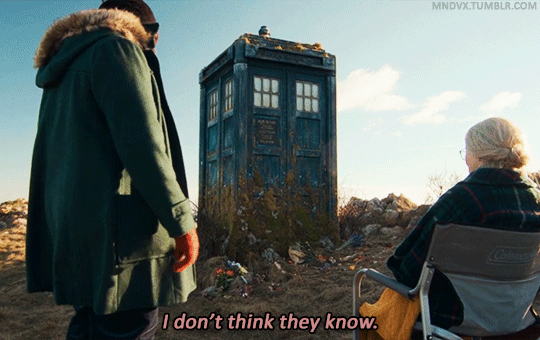
DOCTOR WHO — 73 YARDS (S40E04)
#a mischief actor appearing in doctor who!#a very pleasant surprise#I am pretty sure she is the first mischief actor to be on doctor who#so congrats to rhyanna!!#also everyone please go look up her stuff in mmni#she is AMAZING#amazing singing voice and very chaotic acting choices haha#rhyanna alexander davis#doctor who#73 yards#dw series 14#the tardis#ruby sunday#mischief movie night in#mischief theatre#mischief comedy#mischief in other shows#Youtube
331 notes
·
View notes
Text
Diana Rigg Vs. Joanna Lumley
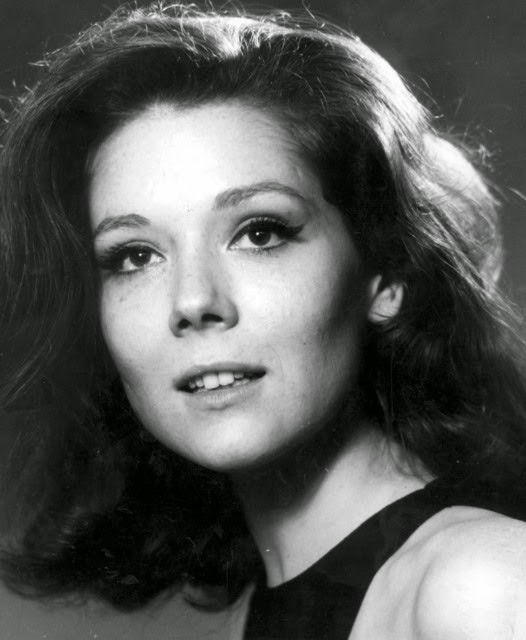
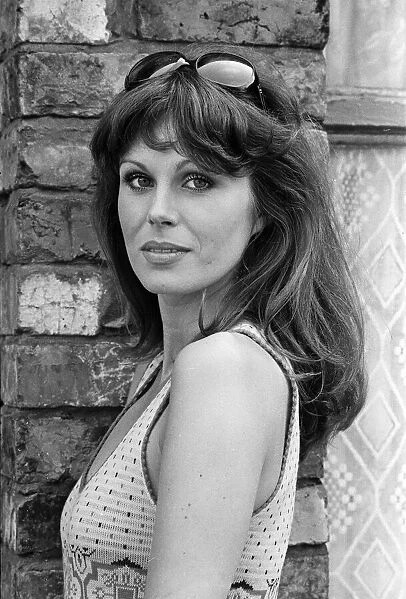
Propaganda
Diana Rigg - (The Avengers, Diana) - Honestly? Just check her out as Emma Peel in any episode of The Avengers. The character herself was a legend - an exceptional spy, wonderful fighter, certified genius, a true feminist role model - not to mention a renowned sex symbol (that leather catsuit... heavens help me...) and fashion icon. As for Diana personally, she was once described by Michael Parkinson as "the most desirable woman he ever met, who radiated a lustrous beauty". She could pivot from funny quips and endearing jokes to stone-cold badassery like it was nothing, and she looked stunning either way. Whenever I look at a pic of her, I have this feeling she's planning some fun mischief and I get the strongest urge to ask her to take me along. Need anything more? Here, have some pics (pics below the cut)
Joanna Lumley - (Sapphire and Steel, The New Avengers, Absolutely Fabulous) - Staple of British TV, Joanna Lumley is best known for her comedic output encompassing many shows, but her most famous would have to be Absolutely Fabulous, playing the promiscuous and indulgent career woman Patsy Stone. I adore her most for her haunting turn in Sapphire and Steel opposite similar babe material David McCallum. Her cheer shines through a chilly exterior, and she balances underrated scream queen content with caring and heartfelt moments. She's a human rights activist and common face on British charity advertising. She was also a model, a bond girl and Doctor Who (briefly), which can't hurt her chances. I petition you graceful tumblr users of the world, vote for national treasure Joanna Lumley!!
Master Poll List of the Hot Vintage TV Ladies Bracket
Additional propaganda below the cut
Diana Rigg:
When people think of The Avengers, they think Steed and Peel (or they think the marvel property but that’s neither here nor there). I know people who thought Mrs. Peel was the ONLY woman Steed worked with, Diana Rigg was Just That Good (she was only on two seasons!). She was one of those actors that could so perfectly play comedy in any form, her dry, sardonic wit was marvelous, but so was her physical and slapstick comedy, and she could do drama too! If you’ve seen her in interviews you’d also know how fabulously humble and kind she was. I don’t know if I’ve ever been more attracted to a TV woman than I’ve been to Diana Rigg. Some photos of her:

the SMILE!!!!
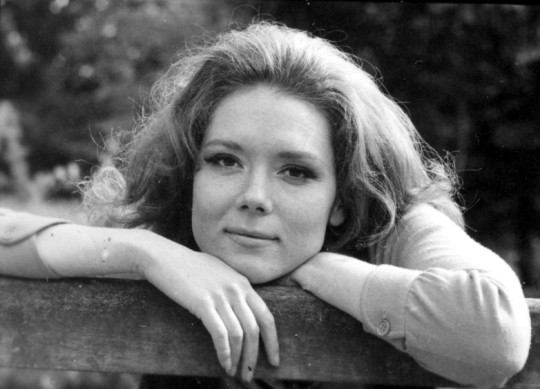
I like a woman that could kill me in one shot
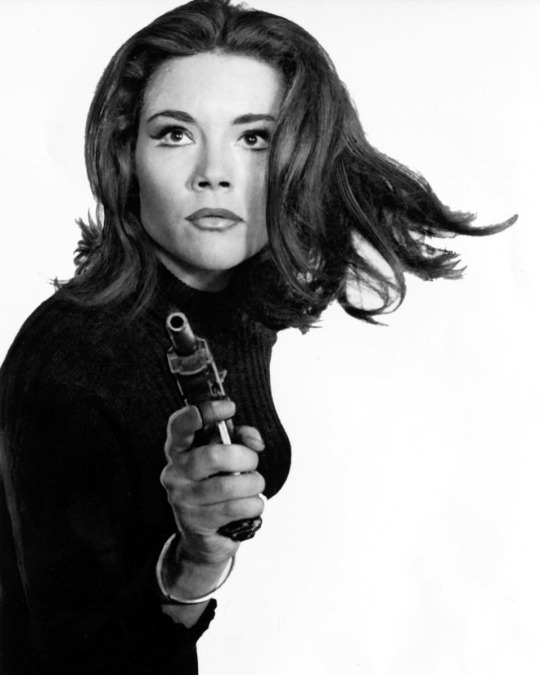
tell me she's not endearing I DARE you
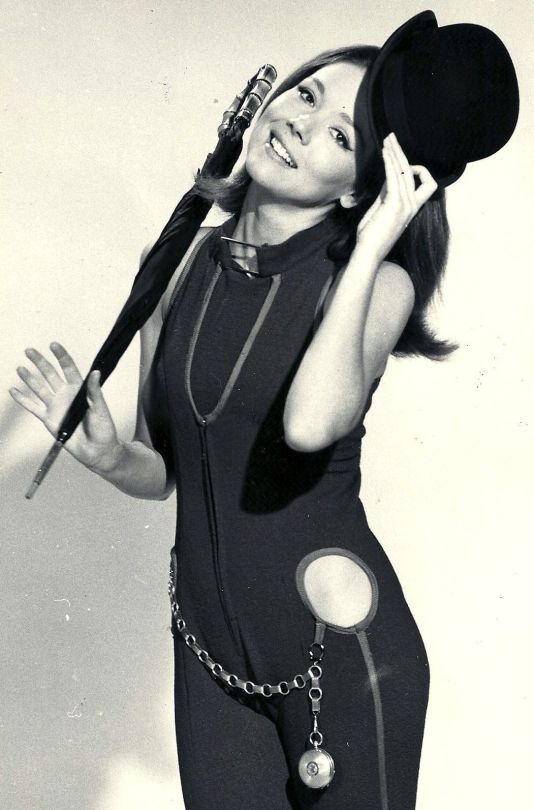
excuse me I'm overcome with sinful thoughts

hello 911 I think I'm having a heart attack
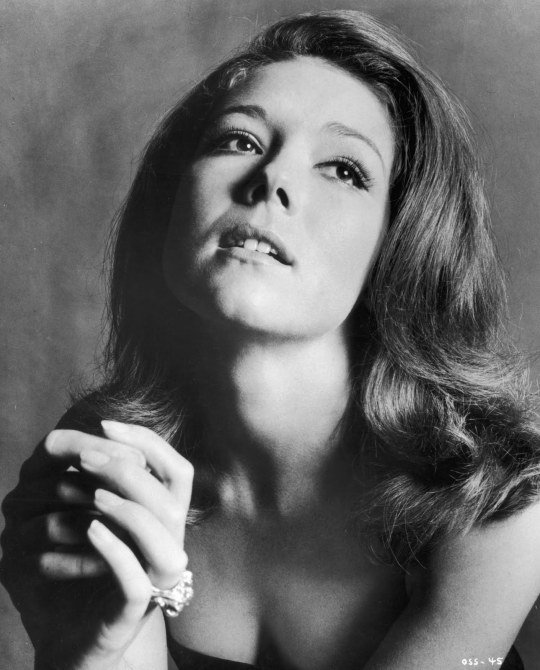

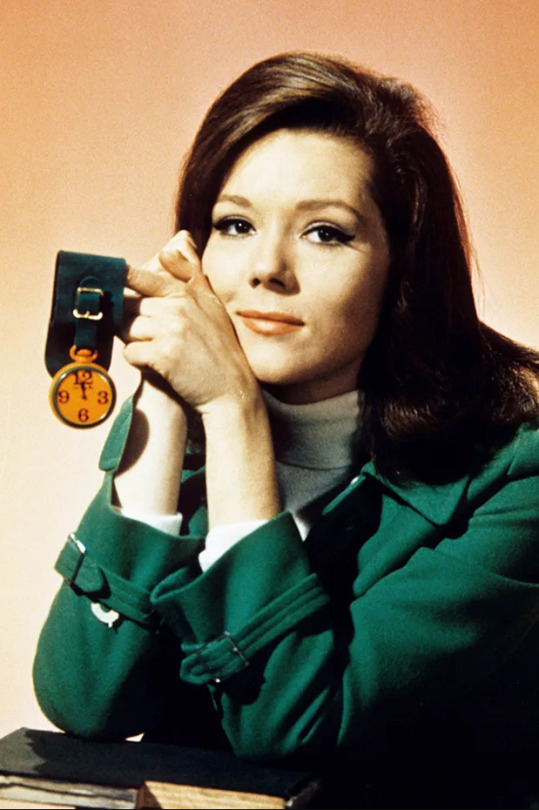
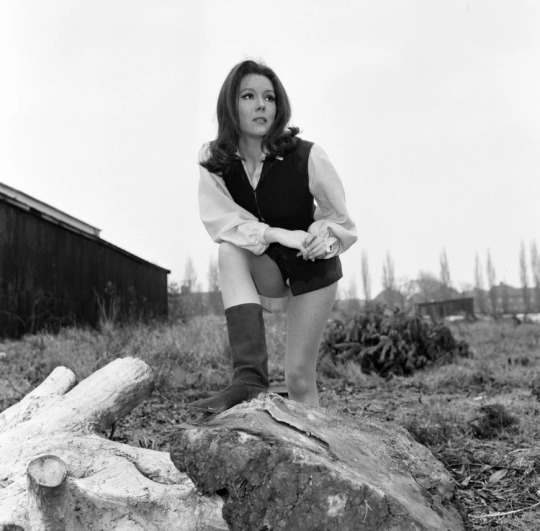
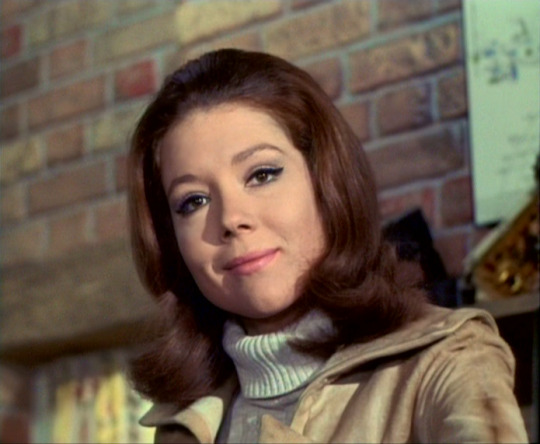
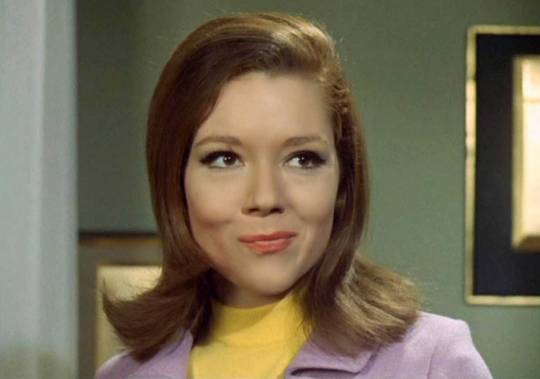

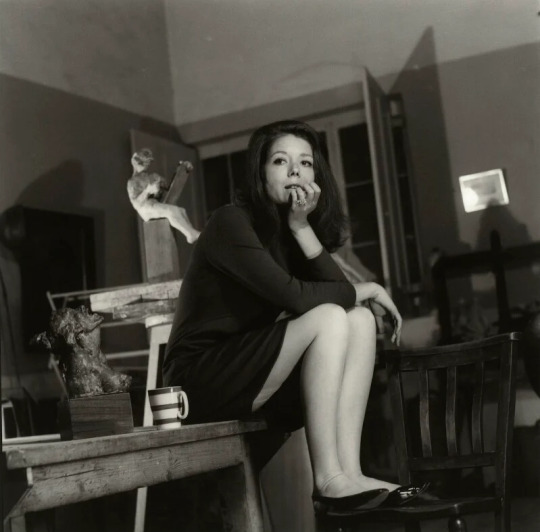

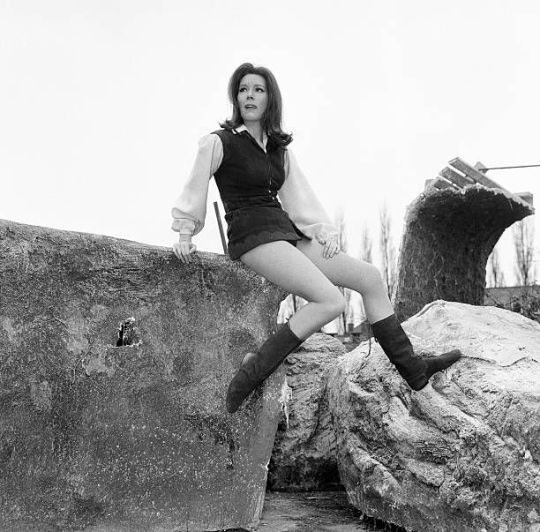
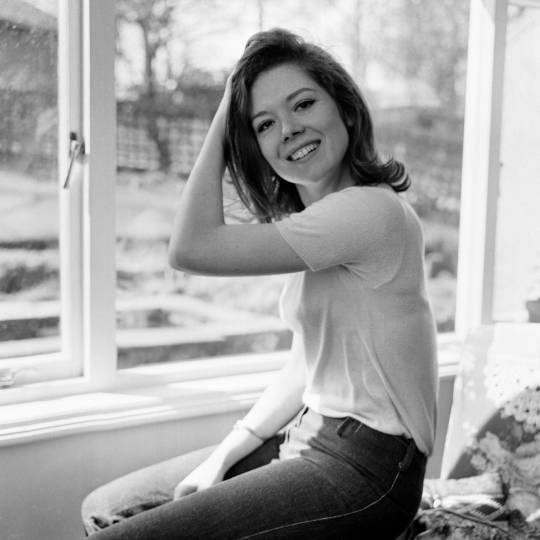

Here's an interview I fell for her in:
Diana Rigg | Interview | The Avengers | Good Afternoon | 1974 | Part one
youtube
Her first appearance in The Avengers (In series 4, if you can believe it):
The Avengers: Emma Peel First Appearance HD
youtube
37 notes
·
View notes
Text
3.52 Home
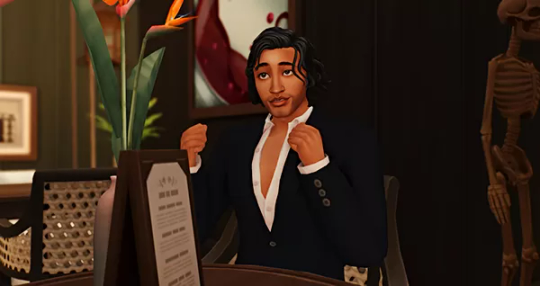

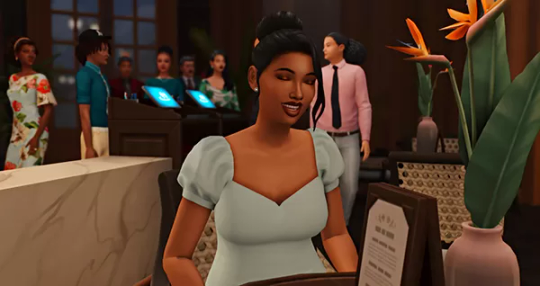
As soon as we settled at the table, I complimented her appearance immediately. I may have been a dating noob, but I grew up with two women in the house and learned a lot about what women liked. She blushed, playfully asking me to stop, saying I was doing too much. See? Simple and elegant. She picked up the menu to hide from me, and I told her to order whatever she wanted and not to be shy. But she placed the menu down and gave me a concerned face instead, and everything inside me tensed up. What have I done now? Am I too late??
"Luca... Why are you doing all of this? I mean, I appreciate it and everything... I'm just a little overwhelmed."
Drat! This gesture was too big, and the whole simple elegance thing was a common thread which weaved together her entire life. I took a deep breath, desperately trying to steady myself and find the right words to explain my intentions and fix this.
"I... I understand if it's too much," I stammered. "I just wanted you to know how special you are to me. We both know I haven't really done a good job of showing you, so I just thought... Sorry to overwhelm you. That is the opposite of what I wanted to do tonight."
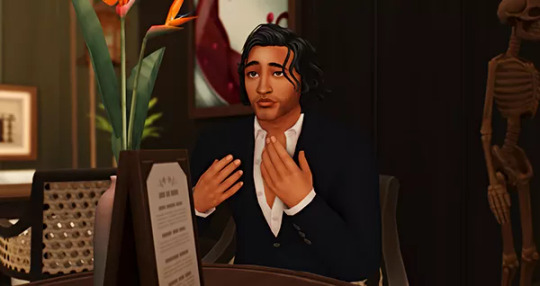
Her eyes softened, and a smile tugged at the corners of her lips, making me hopeful my words had reassured her that my intentions were pure.
"Awww Luca! I don't know what to say!"
Thank the Watcher! I'm not sure what I would have done if I couldn't salvage the moment.
"You don't have to say anything. Just enjoy."
The server came and saved us from an awkward yet very tender moment and took our orders, and I was happy to hear she accepted the gesture despite being uncomfortable and ordered something interesting.
I asked about her day, and she began telling me a wild story about a man who had been rushed in for emergency surgery. They thought he had triple threat based on his symptoms and prepared to operate. But before they put him under, he began to yell and writhe in pain. They asked where it hurt, and he said his stomach. He kept yelling, "Get it out! Get it out!" The doctors didn't know what to think or what was happening. Suddenly, a blood-curdling scream blared throughout the operating room, and an alien burst through the man's stomach!
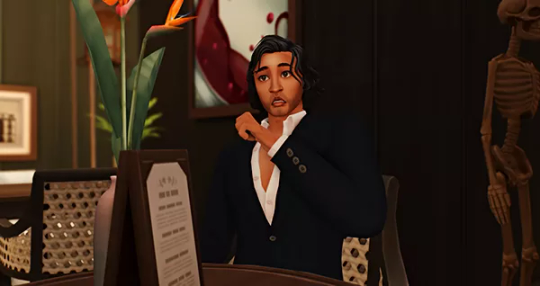
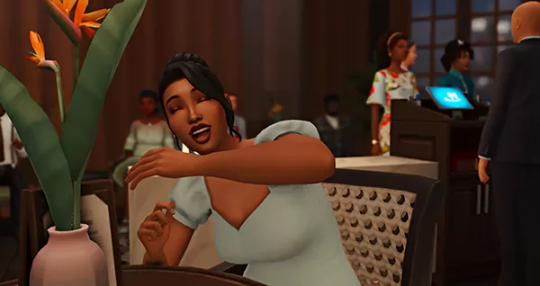
She laughed so hard she couldn't sit up straight.
"Oh my Watcher, you should have seen your face!"
Her laughter was so infectious, I couldn't help but join in. It seemed we both had a dormant goofball trait hidden somewhere.
"Wow. You really had me on the hook," I said, still laughing.
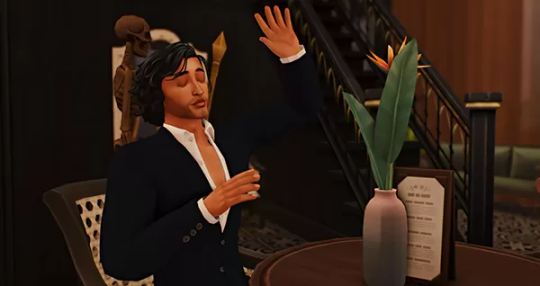
Her eyes sparkled with mischief.
"I couldn't resist!"
"You're a really good storyteller, you know that?"
"Thanks. I love stories. I wanted to be an actor when I was a kid, and I wrote wild tales all the time and acted them out with my toys... Guess that's still in me."
"Sounds like you were quite a character."
"I was an only child. I kinda had to be."
I couldn't imagine being an only child, going through what I went through alone. My sister was my best and only friend, even though she annoyed the hell out of me.
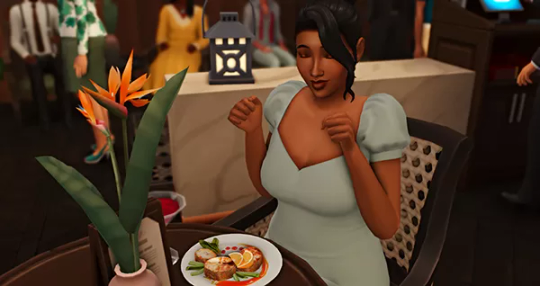
The food arrived quickly, and Sophia squealed in excitement about whatever she had ordered. It looked good enough to snap a picture and hang it on the wall. My dish looked incredible too, but hers had a little extra something special.
As we ate, we continued our conversation, sharing laughter and stories. Despite the time we had already spent together, seeing her smile, observing the expressions on her face, and hearing her voice after only knowing her through words and a static image was an almost surreal experience. I could have watched and listened to her all night. Her presence had an intoxicating effect on me.
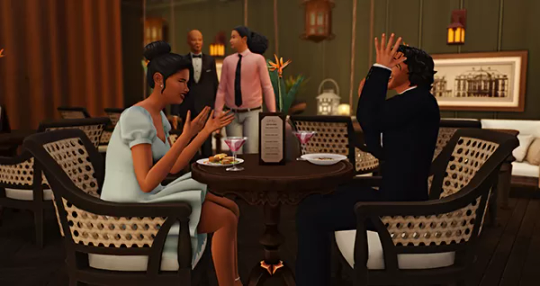
Once our bellies were full and our abs couldn't take anymore laughter, I paid for the meal and prepared to leave. I had two things I wanted to do, but one I refused to do at the restaurant.
I pulled out a rose and handed it to her.
"I'm sorry this date was such short notice, but I'm happy you could join me tonight. Uhhh...I'm glad you're in my life, and...I'm looking forward to spending more time with you."
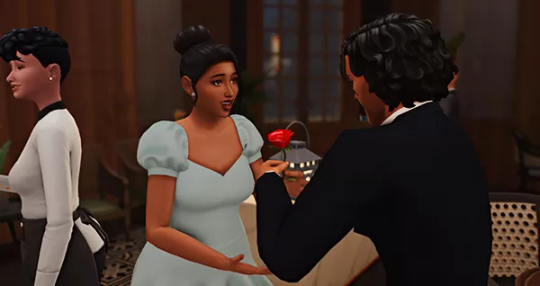
Her twinkling eyes and wide smile were so rewarding.
"Luca!! You're so sweet! It's so funny you did this because," she too pulled out a rose, "I was gonna give you one!"
"No way!"
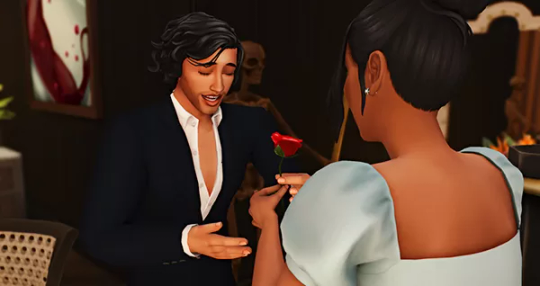
"I'm looking forward to spending more time with you too, and you are very special to me."
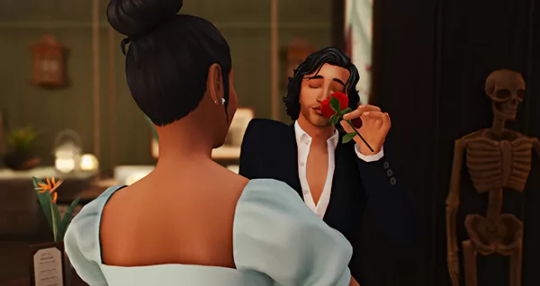
What were the chances two sims arrived at a date carrying not only gifts for each other but also the exact same gift? The feeling of being on the same page with someone was like finding a missing puzzle piece. Just imagine if this one-up behavior continued. A relationship would become a never-ending race to the top when both parties always tried to out-do each other. We'd never stop growing, and progress would never stall. I'd say we were positively laying the groundwork for a strong and stable future.
For the second thing I wanted to do, I asked if I could escort her home. And, no, it wasn't for that. I just wanted privacy. Plus, I wanted to make sure she got home safe.
"I haven't laughed so hard in ages," I said. "Thank you."
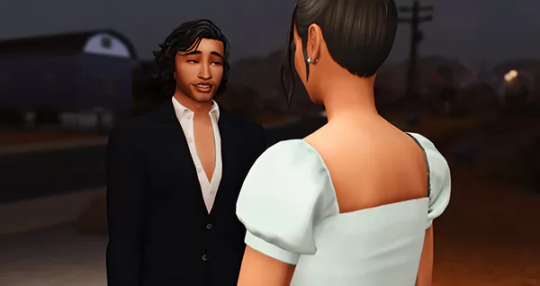
"I should be thanking you! That meal... It was fantastic."
"Sophia... Can I kiss you?"
"I was hoping you would."
Although I had already experienced my first kiss, this one felt like a genuine first because I mustered the courage to initiate it, and my nerves were unexpectedly jittery. As I approached her lips, my heart pounded in my chest. The same kind of hunger I experienced with Yasmine was there, but it wasn't as intense. Sophia was like a plate of warm comfort food, something you want to savor and enjoy. And I did.
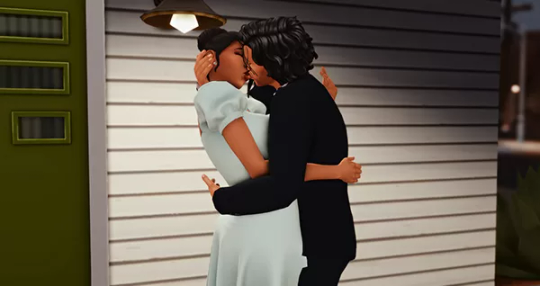
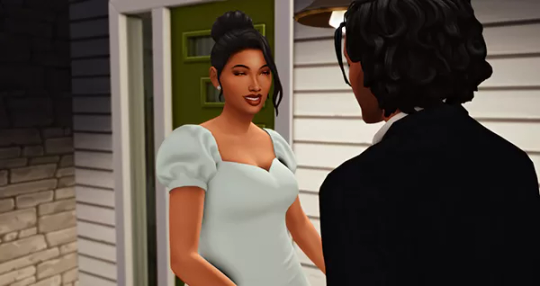
"That was nice," she said with the prettiest smile.
We stood at her front door with our eyes locked in a silent exchange before I realized she might misinterpret my lingering. I mean, if she was down, I would not decline. But we didn't have to do everything in one night. Comfort food, remember? I could come back tomorrow and the next day and the day after that. We had all the time in the world.
"I think I've hi-jacked your night long enough, heh," I joked. "I know you have an early start."
She nodded, though it looked reluctant. I didn't want to go either, but I gave her hand one last squeeze and tried to say goodnight.
"Luca, wait..."
My eyes widened in surprise, and I held my breath as my ears eagerly awaited whatever she'd announce.
"Do you trust me?" she asked.
"Yes," I said much quicker than I imagined I would.
"Do you trust us?"
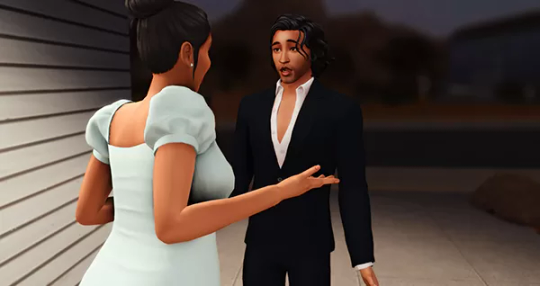
I froze for a second. This was it. This was the moment I leveled up in manhood. No more scared little boy. After some hesitation, internal pep talks, sweaty palms, and deep breaths, a yes stumbled out of my mouth, though weak and non-committal. My goal for the night was to convey my readiness to upgrade our friendship, and that poor excuse for a response did not come close to doing that. I had to try again and cleared my throat.
"I believe in us," I said in full confidence.
"Then stay."
YES!!
"Okay," I said calmly, trying to hide my excitement. "Yeah. Sure, I'll stay."
She held my hands.
"Not just tonight. I don't want us be apart anymore. Come home to me."
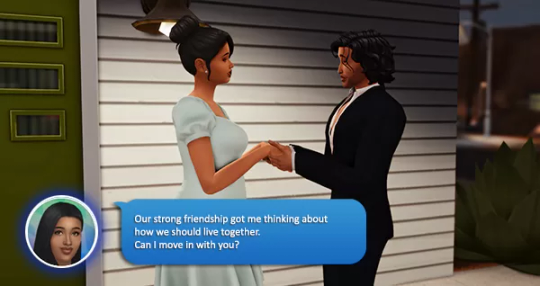
Home...
That word reverberated within me, echoing like a chamber. I was seriously taken aback, as if someone had thrust me into a time warp. It wasn't until I quieted my mind and relaxed my body that I understood why it affected me so deeply. That's what she felt like - home. Comfort food! I'd been confessing it all night, yet I was oblivious to what I actually meant. Moving in with her was sheer madness, and I had never been more terrified. But I took solace in knowing she would be there to face it alongside me.
It shouldn't have surprised me that the first step into the next chapter of my life would be a leap as big as the Strangerville crater. Earlier, I said I shouldn't pressure myself to enter into a relationship right away. We could remain friends until I felt comfortable pursuing something more, and living with her would accomplish the exact opposite of that. But to be honest, I didn't care anymore. All my dreams revolved around being with her, and now, that dream was within my grasp. Despite being consumed by fear, I couldn't help but feel a sense of pride for daring to take the leap. That's what a man does.
#ISBI challenge#sims 4 story#sims 4 gameplay#adolting#adolting gen 3#luca winston murillo#sophia aguilar
35 notes
·
View notes
Text
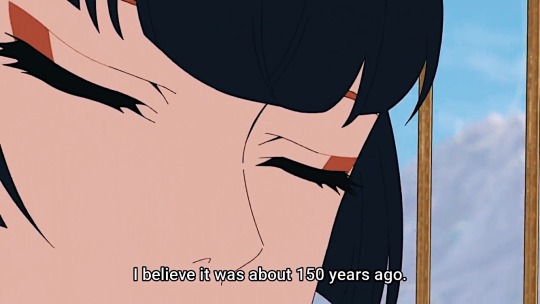
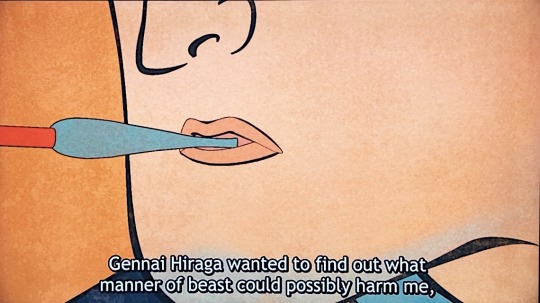
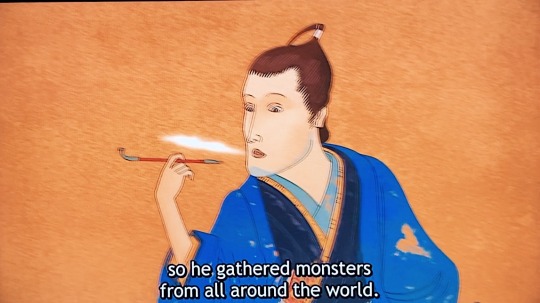
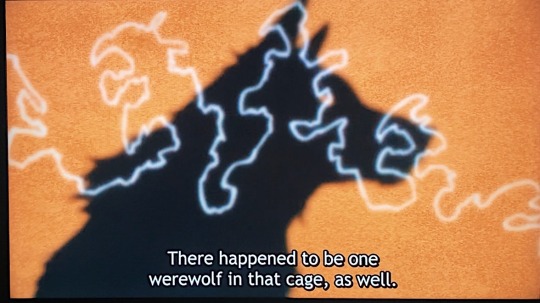
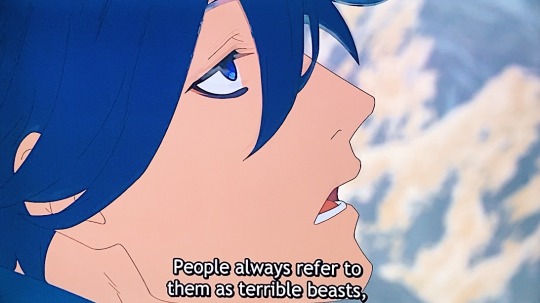
Gennai Hiraga.

Of all the name-droppings the series has been doing, so far they do it exceptionally well when it comes to Japanese folklore and historical personages.
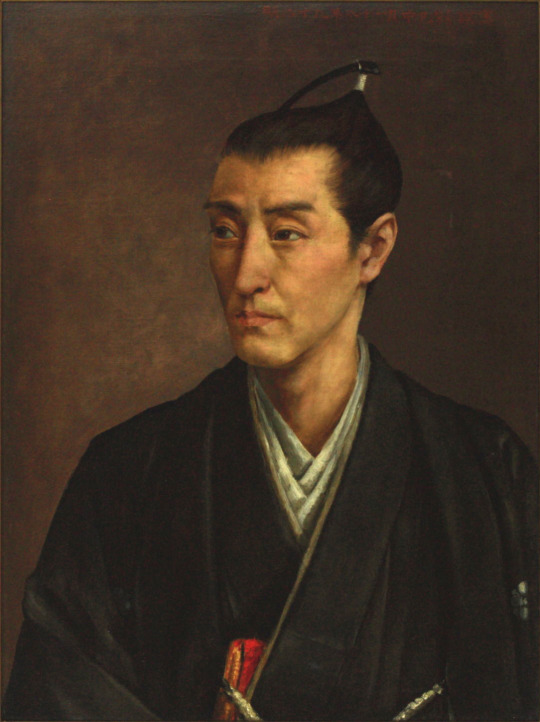
Hiraga was a real person. Now, what’s so interesting about him is that not only he came from a low-ranking samurai family during the Edo Period, he was also a polymath, a rōnin (wandering samurai) a doctor, a pharmacologist, an inventor. Most of all, he was purported to be a homosexual. He frequented the brothels that showcased male prostitutes.
Hiraga (1726-1779) was a prominent Rangakusha (scholar of "Dutch"-i.e., European-learning) and botanist who conducted experiments with asbestos and electricity. He was also one of the most popular writers of the late Tokugawa period and a regular patron of the male brothels referred to as kodomo-ya. His friend, the leading scholar Ota Nanpo, recorded that "when [Gennai] had money, he hurried to spend it in Yoshicho on the pleasure-boys. There he would spend days at a time, and that is why he glorified nanshoku in Nenashigusa.
He was also a writer, a satirist to be exact. He also wrote guidebooks on the male prostitution in Japan.
Those who like female prostitutes dislike youths; those who like youths revile female prostitutes. — Hiraga Gennai, “San no asa” (1768)
…
Gennai himself, according to Ota Nanpo, often visited Yoshicho and the "southern wards" of Edo, with their nanshoku teahouses, but never went to Yoshiwara, with its female prostitutes. His biographers claim the scholar was not simply a shudo-zuki but an onna-girai, or "woman-hater."' Men identified as such, like similar characters in Ming-Qing or even in English Augustan literature, find any contact with the female sex revolting.
…
For the benefit of such culturally deprived men, Gennai lightheartedly describes the nanshoku-jaya experience, including its thrills and frustrations: “Stroking his patron's arm, [a male prostitute] will strike a dreamlike pose, as though he is himself reaching heights of ecstasy. He'll make endless, capricious vows,i and address you with the most intimate names. [Tears] will appear about the eyes on his dazzled face. Aara, that's strange! Is this some apparition? A group [sent from] his manager!k Yai! Those of you who love sweets might find this amusing. But don't laugh. It'd be the gravest mistake not to eat up all those crumbs. You might start taking a liking to wine!”
One of his works dealt with farting and a story about a Kappa “that tries to seduce the actor and then attempts to drown them, in order to complete their task. In the end the Kappa ends up falling for the young actor and instead brings back a less attractive Onnagata as a consolation prize.”
Kappa is a type of a water sprite in Japanese folklore.
Mischievous by nature, they loudly pass gas in public and love to peek up women’s kimonos. Sometimes their mischief turns violent. Kappa have been known to kidnap or rape swimming women, and kill people. A kappa’s preferred method of attack is to drown its victims, or bite them to death under water. Kappa also devour humans alive. Usually they go for the rear end to get at the shirikodama, a mythical ball of flesh located just inside the anus.
Anyway, Gennai Hiraga is indeed an interesting person. The episode tied him up nicely emphasising his Jack of all trades-esque personality.
Source: “Male Colors: The Construction of Homosexuality in Tokugawa Japan,” Gary P. Leupp
#undead girl murder farce#undead murder farce#aya rindo#tsugaru shinuchi#shizuku hasei#episode 9#werewolves#gennai hiraga#ugmf spoilers
50 notes
·
View notes
Text
Vesuviella: Part 12
The rehearsal in question is to happen in Portia’s garden, considered to be neutral territory by nobility and common people alike. It's on your way there that you spot Asra on the bridge to the Palace gates, seemingly lost in thought to the point of disrupting the flow of human traffic around them. They start back to the present as soon as you approach and call their name. “MC! There you are, I was just thinking about you.”
“Nothing too bad, I hope.” You smile and fall into step next to him, shoulders bumping playfully.
“Hmm? And how would I come up with anything bad to think about you? You underestimate yourself, MC.”
“Are you saying that I don’t know myself?”
“I’m saying that you don’t know your influence.” Their eyes slide over to you, full of mischief. “Not just anyone can convince Muriel to stand on a stage. Or Nadi to participate in an Ilya-concocted scheme.”
You sigh as you navigate the garden maze, Portia’s cottage moments away. “What are you getting at, Asra?”
He’s getting ready to respond when you both catch snippets of a loud, brash voice in the garden. His dimples drop and you hear him mumble something along the lines of and convince me to call a goat my sister, apparently.
You break them out of their trance with a nudge and a smirk. “Stepsister.”
They sigh and nod. “Of course, how could I forget. My stepsister.”
“MC! I knew it!” You’re being offered a golden elbow as Lucio eyes the magician with poorly concealed annoyance. “You kept them waiting on purpose, didn’t you, Asra?”
“Waiting on who?” He shades his eyes with his hand, scanning the area. “Ilya and Pasha are nowhere to be seen, or anyone else important for that matter.”
You dig your elbow into Asra’s ribs and use the golden arm to steer Lucio back towards the garden before he can respond to the teasing. “I’m sure they’ll be here any second. Have you read your lines, Lucio?”
He pouts and flicks the pages open. “Of course I’ve read them. Nobody’s a better actor than I am!” His sharp smile returns as he leans in to show you a page towards the back of the booklet. “Though if you ask me, the prince should’ve made a different decision here. Who cares if I can’t fit into the shoe?" He moves in closer, tone shifting to something more flirtatious. "You know what they say about big feet, MC.”
“That they belong on clowns?” Asra’s leaning in too, watching in glee as Lucio's face reddens. You watch the tension spark between them, unsure of how to proceed, when Julian’s shout mercifully interrupts the developing stare down.
“Perfect! I knew you two were the right decision. Sibling rivalry is key to this dynamic.”
“Us, siblings?” The two of them shudder and lean away as the doctor approaches.
“Rivalry?” You ponder quietly to yourself. Portia appears from behind her brother, face filled with the most loving pity as she leads you away.
“MC, you sweet summer child.”
#vesuviella#arcana brainrot#the arcana brainrot#the arcana#the arcana fanfic#the arcana fic#the arcana crackfic#asra the arcana#julian the arcana#nadia the arcana#muriel the arcana#portia the arcana#lucio the arcana#the arcana game#the arcana shitpost#asra alnazar#julian devorak#nadia satrinava#muriel of the kokhuri#portia devorak#lucio morgasson
45 notes
·
View notes
Video
tumblr
'Loki' takes over: Tom Hiddleston on his new TV series and a decade in the MCU
Ten years after Hiddleston first chose chaos in Thor, Marvel’s fan favorite God of Mischief is going even bigger with his time-bending Disney+ show.
Tom Hiddleston is Loki, and he is burdened with glorious purpose: After playing Thor's puckish brother for over a decade in the Marvel Cinematic Universe, no one understands the mercurial Asgardian God of Mischief as well as the actor. He can teach an entire seminar on Loki if given the opportunity — which he actually did during pre-production on his forthcoming Disney+ show. In conversation, Hiddleston quotes lines from his MCU debut, 2011's Thor, almost verbatim, and will playfully correct you if you mistakenly refer to Asgard's Rainbow Bridge as the Bifrost, which is the portal that connects Loki and Thor's homeworld to the Nine Realms, including Midgard, a.k.a. Earth. "Well, the Bifrost technically is the energy that runs through the bridge," he says with a smile. "But nine points to Gryffindor!" And when he shows up to the photo shoot for this very digital cover, he hops on a call with our photo editor to pitch ways the concept could be even more Loki, like incorporating the flourish the trickster does whenever magically conjuring something. The lasting impression is that playing Loki isn't just a paycheck.
"Rather than ownership, it's a sense of responsibility I feel to give my best every time and do the best I can because I feel so grateful to be a part of what Marvel Studios has created," the 40-year-old Brit tells EW over Zoom a few days after the shoot and a week out from Thor's 10th anniversary. "I just want to make sure I've honored that responsibility with the best that I can give and the most care and thought and energy."
After appearing in three Thor movies and three Avengers, Hiddleston is bringing that passion to his first solo Marvel project, Loki, the House of Ideas' third Disney+ series following the sitcom pastiche WandaVision and the topical The Falcon and the Winter Soldier. Led by head writer Michael Waldron (Doctor Strange in the Multiverse of Madness, Heels), the six-episode drama sees Hiddleston's shapeshifting agent of chaos step out from behind his brother's shadow and into the spotlight for a timey-wimey, sci-fi adventure that aims to get to the bottom of who Loki really is. "I wanted to explore slightly more complex character questions," says Waldron. "It's not just good versus bad. Is anybody all good? Is anybody all bad? What makes a hero, a hero? A villain, a villain?"
Even though Loki — who loves sowing mayhem with his illusion magic and shapeshifting, all with a major chip on his shoulder — has never been one for introspection, the idea of building an entire show around him was a no-brainer for Marvel. When asked why Loki was one of the studio's first Disney+ shows, Marvel president Kevin Feige replies matter-of-factly, "More Hiddleston, more Loki." First introduced as Thor's (Chris Hemsworth) envious brother in Kenneth Branagh's Thor, Loki went full Big Bad in 2012's The Avengers. That film cemented the impish rogue as one of the shared universe's fan favorites, thanks to Hiddleston's ability to make him deliciously villainous yet charismatic and, most importantly, empathetic. The character's popularity is one of the reasons he's managed to avoid death many times.
"He's been around for thousands of years. He had all sorts of adventures," says Feige. "Wanting to fill in the blanks and see much more of Loki's story [was] the initial desire [for the series]."
The Loki we meet on the show is not the one who fought the Avengers in 2012 and evolved into an antihero in Thor: The Dark World and Thor: Ragnarok before meeting his demise at the hands of the mad titan Thanos (Josh Brolin) in 2018's Avengers: Infinity War. Instead, we'll be following a Loki from a branched timeline (a variant, if you will) after he stole the Tesseract following his thwarted New York invasion and escaped S.H.I.E.L.D. custody during the time heist featured in Avengers: Endgame. In other words, this Loki hasn't gone through any sort of redemption arc. He's still the charming yet petulant god who firmly believes he's destined to rule and has never gotten his due.
Premiering June 9, Loki begins with the Time Variance Authority — a bureaucratic organization tasked with safeguarding the proper flow of time — arresting the Loki Variant seen in Endgame because they want his help fixing all of the timeline problems he caused while on the run with the Tesseract. So there will be time travel, and a lot more of it than in Endgame. As Loki makes his way through his own procedural, he'll match wits with new characters including Owen Wilson's Agent Mobius, a brilliant TVA analyst, and Gugu Mbatha-Raw's Judge Renslayer. The question in early episodes is whether Loki will help them or take over.
"One of the things Kevin Feige led on was, 'I think we should find a way of exploring the parts of Loki that are independent of his relationship with Thor,' or see him in a duality or in relationship with others, which I thought was very exciting," says Hiddleston, who also serves as an executive producer on the show. "So the Odinson saga, that trilogy of films, still has its integrity, and we don't have to reopen it and retell it."
Yet, in order to understand where Loki is going, it's important to see where he came from.
Hiddleston can't believe how long he and Loki have been connected. "I've been playing this character for 11 years," he says. "Which is the first time I have said that sentence, I realize, and it [blows] my mind. I don't know what percentage that is exactly of my 40 years of being alive, but it's substantial."
His time as Loki actually goes a bit further back, to 2009 — a year after Robert Downey Jr. big banged the MCU into existence with Iron Man — when he auditioned for Thor. It's no secret that Hiddleston initially went in for the role of the titular God of Thunder, but Feige and director Kenneth Branagh thought his natural charm and flexibility as an actor made him better suited for the movie's damaged antagonist. "Tom gave you an impression that he could be ready for anything, performance-wise," says Branagh, who had previously worked with him on a West End revival of Checkov's Ivanov and the BBC series Wallander. "Tom has a wild imagination, so does Loki. He's got a mischievous sense of humor and he was ready to play. It felt like he had a star personality, but he was a team player."
Hiddleston fully immersed himself in the character. Outside of studying Loki's history in the Marvel Comics, he also researched how Loki and the Trickster God archetype appeared across mythology and different cultures. "He understood that he was already in something special [and] it was a special character in a special part of that early moment in the life of the Marvel universe where [he] also needed to step up in other ways," says Branagh, who was impressed by the emotional depth Hiddleston brought to the part, especially when it came to how isolated Loki felt in the Asgardian royal family.
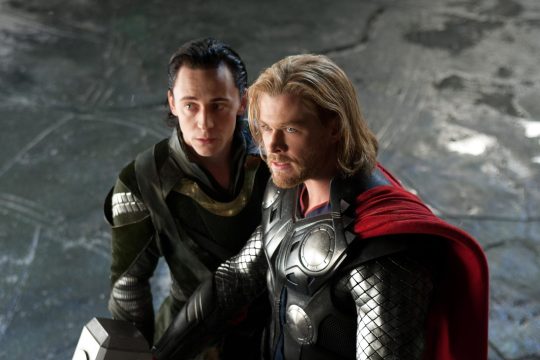
There was a lot riding on that first Thor feature. For one, no one knew if audiences would immediately latch onto a Shakespearean superhero movie partially set on an alien planet populated by the Norse Gods of legend. Second, it was integral to Feige's plans for the shared universe. Loki was supposed to be the main villain in The Avengers, which would not only mirror how Earth's mightiest heroes joined forces in 1963's Avengers #1 but also give Thor a believable reason for teaming up with Iron Man, Captain America (Chris Evans), and the rest of the capes. Feige first clued Hiddleston into those larger plans when the actor was in L.A. before Thor started shooting.
"I was like, 'Excuse me?' Because he was already three, four steps ahead," says Hiddleston. "That took me a few minutes to process, because I didn't quite realize how it just suddenly had a scope. And being cast as Loki, I realized, was a very significant moment for me in my life, and was going to remain. The creative journey was going to be so exciting."
Hiddleston relished the opportunity to go full villain in Avengers, like in the scene where Loki ordered a crowd to kneel before him outside a German opera house: "It's the unspoken truth of humanity, that you crave subjugation," says the Machiavellian god. "The bright lure of freedom diminishes your life's joy in a mad scramble for power, for identity. You were made to be ruled. In the end, you will always kneel."
"I just knew that in the structure of that film, I had to lean into his role as a pure antagonist," Hiddleston recalls. "What I always found curious and complex about the way Loki is written in Avengers, is that his status as an antagonist comes from the same well of not belonging and being marginalized and isolated in the first Thor film. Loki now knows he has no place in Asgard."
Loki did find a place within the audience's hearts, though. Feige was "all in" on Hiddleston as his Loki from the beginning, but even he couldn't predict how much fans would love him. Feige recalls the reaction at the 2013 San Diego Comic-Con: "Did we know that after he was the villain in two movies, he would be bringing thousands of people to their feet in Hall H, in costume, chanting his name? No, that was above and beyond the plan that we were hoping for and dreaming of." It was a dream Feige first got an inkling of a year earlier during the Avengers press tour when a Russian fan slipped past security, snuck into Mark Ruffalo's car, and asked the Hulk actor to give Hiddleston a piece of fan art she created. "That was one of the early signs there was much more happening with this quote-unquote villain."
Despite that popularity, the plan was to kill Loki off in 2013's Thor: The Dark World, but the studio reversed course after test audiences refused to believe he actually died fighting the Dark Elves. Alas, he couldn't out-illusion death forever. After returning in Taika Waititi's colorful and idiosyncratic Thor: Ragnarok, Hiddleston's character perished for real in the opening moments of Infinity War. In typical Loki fashion, before Thanos crushed his windpipe, he delivered a defiant speech that indicated he'd finally made peace with the anger he felt toward his family.
"It felt very, very final, and I thought, 'Okay, that's it. This is Loki's final bow and a conclusive end to the Odinson saga,'" says Hiddleston, who shot that well-earned death scene in 2017.
But, though he didn't know it yet, the actor's MCU story was far from over.
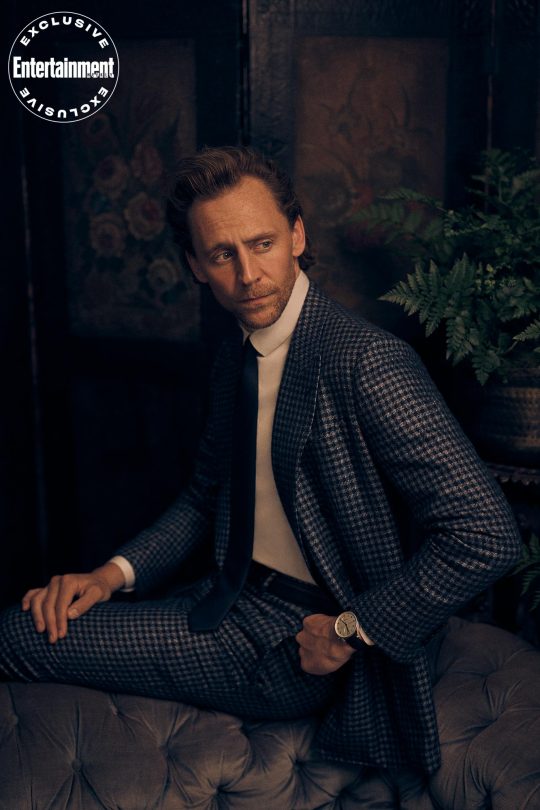
Credit: Charlie Gray for EW
When Hiddleston returned to film two scenes in Avengers: Endgame in 2017, he had no idea where Loki portaled off to after snatching the Tesseract. "Where'd he go? When does he go? How does he get there? These are all questions I remember asking on the day, and then not being given any answers," Hiddleston recalls. To be fair, it's likely the Powers That Be didn't necessarily have answers then. While Feige can't exactly recall when the writers' room for Endgame first devised Loki's escape sequence, he does know that setting up a future show wasn't the primary goal — because a Loki series wasn't on the horizon just yet.
"[That scene] was really more of a wrinkle so that one of the missions that the Avengers went on in Endgame could get screwed up and not go well, which is what required Cap and Tony to go further back in time to the '70s," says Feige. Soon after that, though, former Disney CEO Bob Iger approached Feige about producing content for the studio's forthcoming streaming service. "I think the notion that we had left this hanging loose end with Loki gave us the in for what a Loki series could be. So by the time [Endgame] came out, we did know where it was going."
As for Hiddleston, he didn't find out about the plans for a Loki show until spring 2018, a few weeks before Infinity War hit theaters. "I probably should not have been surprised, but I was," says the actor. "But only because Infinity War had felt so final."
Nevertheless, Hiddleston was excited about returning for his show. He was eager to explore Loki's powers, especially the shapeshifting, and what it meant that this disruptive figure still managed to find a seat beside the gods in mythology. "I love this idea [of] Loki's chaotic energy somehow being something we need. Even though, for all sorts of reasons, you don't know whether you can trust him. You don't know whether he's going to betray you. You don't why he's doing what he's doing," says Hiddleston. "If he's shapeshifting so often, does he even know who he is? And is he even interested in understanding who he is? Underneath all those masks, underneath the charm and the wit, which is kind of a defense anyway, does Loki have an authentic self? Is he introspective enough or brave enough to find out? I think all of those ideas are all in the series — ideas about identity, ideas about self-knowledge, self-acceptance, and the difficulty of it."
“The series will explore Loki's powers in a way they have not yet been explored, which is very, very exciting.”
The thing that truly sold Hiddleston on the show was Marvel's decision to include the Time Variance Authority, a move he describes as "the best idea that anybody had pertaining to the series." Feige and Loki executive producer Stephen Broussard had hoped to find a place for the TVA — an organization that debuted in 1986's Thor #372 and has appeared in She-Hulk and Fantastic Four stories — in the MCU for years, but the right opportunity never presented itself until Loki came along. "Putting Loki into his own procedural series became the eureka moment for the show," says Feige.
The TVA's perspective on time and reality also tied into the themes that Waldron, Loki's head writer, was hoping to explore. "Loki is a character that's always reckoning with his own identity, and the TVA, by virtue of what they do, is uniquely suited to hold up a mirror to Loki and make him really confront who he is and who he was supposed to be," says Waldron. Hiddleston adds: "[That] was very exciting because in the other films, there was always something about Loki that was very controlled. He seemed to know exactly what the cards in his hand were and how he was going to play them…. And Loki versus the TVA is Loki out of control immediately, and in an environment in which he's completely behind the pace, out of his comfort zone, destabilized, and acting out."
To truly dig into who Loki is, the creative team had to learn from the man who knows him best: Hiddleston. "I got him to do a thing called Loki School when we first started," says director Kate Herron. "I asked him to basically talk through his 10 years of the MCU — from costumes to stunts, to emotionally how he felt in each movie. It was fantastic."
Hiddleston got something out of the Loki school, too. Owen Wilson both attended the class and interviewed Hiddleston afterward so that he could better understand Loki, as his character Mobius is supposed to be an expert on him. During their conversation, Wilson pointedly asked Hiddleston what he loved about playing the character.
"And I said, 'I think it's because he has so much range,'" says Hiddleston. "I remember saying this to him: 'On the 88 keys on the piano, he can play the twinkly light keys at the top. He can keep it witty and light, and he's the God of Mischief, but he can also go down to the other side and play the heavy keys. And he can play some really profound chords down there, which are about grief and betrayal and loss and heartbreak and jealousy and pride.'" Hiddleston recalls Wilson being moved by the description: "He said, 'I think I might say that in the show.' And it was such a brilliant insight for me into how open Owen is as an artist and a performer.'"
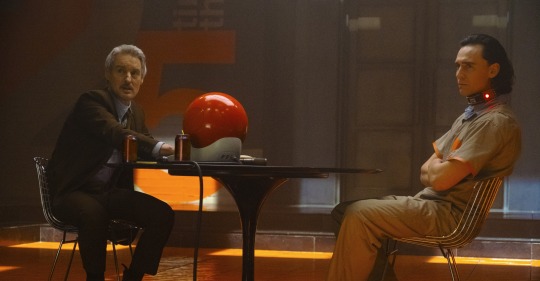
Owen Wilson as Mobius and Tom Hiddleston as Loki in 'Loki.'| Credit: Chuck Zlotnick/Marvel Studios
Everyone involved is particularly excited for audiences to see Hiddleston and Wilson's on-screen chemistry. "Mobius is not unlike Owen Wilson in that he's sort of nonplussed by the MCU," says Feige. "[Loki] is used to getting a reaction out of people, whether it's his brother or his father, or the other Avengers. He likes to be very flamboyant and theatrical. Mobius doesn't give him the reaction he's looking for. That leads to a very unique relationship that Loki's not used to."
As for the rest of the series, we know that Loki will be jumping around time and reality, but the creative team isn't keen on revealing when and where. "Every episode, we tried to take inspiration from different things," says Waldron, citing Blade Runner's noir aesthetic as one example.
"Part of the fun of the multiverse and playing with time is seeing other versions of characters, and other versions of the titular character in particular," says Feige, who also declined to confirm if Loki ties into Doctor Strange in the Multiverse of Madness and/or other upcoming projects.
Making Loki was especially meaningful to Hiddleston because they shot most of it during the pandemic, in late 2020. "It will remain one of the absolute most intense, most rewarding experiences of my life," he says. "It's a series about time, and the value of time, and what time is worth, and I suppose what the experience of being alive is worth. And I don't quite know yet, and maybe I don't have perspective on it, if all the thinking and the reflecting that we did during the lockdown ended up in the series. But in some way, it must have because everything we make is a snapshot of where we were in our lives at that time."
While it remains to be seen what the future holds for Loki beyond this initial season, Hiddleston isn't preparing to put the character to bed yet. "I'm open to everything," he says. "I have said goodbye to the character. I've said hello to the character. I said goodbye to the character [again]. I've learned not to make assumptions, I suppose. I'm just grateful that I'm still here, and there are still new roads to explore."
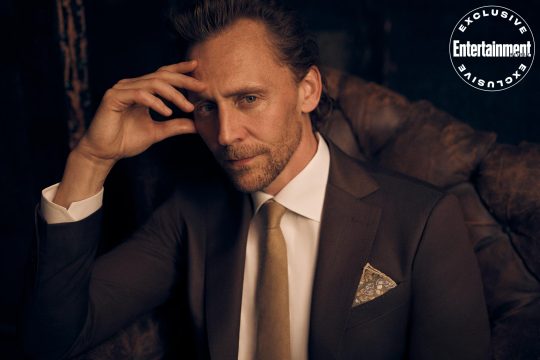
518 notes
·
View notes
Text

essentially a list of fics that i want to prioritize writing!
i don’t know when they’ll be posted, but everything included in this list will most likely be released sooner or later (aka they will not be scrapped)
#wips tag
updated: 27.05.23

WORKS IN PROGRESS:

✩ our beloved summer | jjk
exes to lovers, producer x songwriter au
you made a vow to hate jeon jungkook ever since he packed up and left you without a single explanation, but when he shows up at your door after years of radio silence, it turns out that maybe your resolve isn’t as strong as you thought.

✩ a case of you | jjk
strangers to lovers, actor x actress au
part of a collab, coming in april!
jeon jungkook is the show business’ golden boy ever since he rose to fame seven years ago. with a face sculpted by the gods, as well as oozing charisma and talent, it’s no surprise that he turns heads and steals hearts wherever he goes. but underneath that facade of the perfect man whom everyone adores and the highly acclaimed actor that every casting director wants to book, there are hushed whispers left and right that the golden boy isn’t at all who he appears to be. as the actress starring alongside jungkook in his upcoming drama, you have a front row seat to see if he’ll prove the rumors false, or if he’ll make the biggest project of your career go up in flames.

✩ canine conundrum | pjm
strangers to lovers, dog trainer au
the perfect conundrum consists of three variables: you, park jimin, and a golden retriever who does not give a flying fuck where he takes a dump.

✩ isn’t it romantic? | myg
strangers to frenemies (?) to lovers, coworker au, magazine columnist au
many things in life have a polar opposite: left and right, night and day, yin and yang, you and min yoongi... hopeless romantic meets gloomy cynic. the only thing you seem to share is a magazine column but even then, you still can’t seem to understand how min yoongi can be called ‘the love doctor’ when he is the antithesis of everything love represents.

✩ lightning in a bottle | jjk
strangers to lovers, summer romance au, venice au
when you think of venice, you think of the boy with the sunshine smile and an ever-present glint of mischief in his eyes. the boy who held your hand tightly and kissed you breathless, who taught you how to enjoy life and all it has to offer.

✩ breakable heaven | jjk
friends to lovers, brother’s best friend au, secret relationship au
when jungkook was 19, he let you slip away. now that you’re back four years later, he really doesn’t want to make that same mistake twice.

✩ new romantics | jjk
strangers to lovers, college au, shy boy!jungkook
you’re bored and maybe a little butthurt, and shy jungkook seems like the perfect prey.
37 notes
·
View notes
Link
[Old news for any fans who’ve been around tad longer, but entertaining read nonetheless. We propably wouldn’t have him playing Loki had it gone differently] Article date: 10 May 2021
It’s hard to imagine anyone else playing the Pirates of the Caribbean characters — especially Johnny Depp’s iconic Jack Sparrow — and yet, very early on in the casting stages, another actor auditioned for a role in the first movie…to play Will Turner.
Back then, the actor was a relative unknown, but now most will know him as one of the leading men in The Walt Disney Company’s other blockbuster franchise — the Marvel Cinematic Universe.
Who almost played Will Turner?
One of the biggest franchises in Disney’s catalog — albeit before buying Marvel Entertainment in 2009 and Lucasfilm in 2012 — was Pirates of the Caribbean.
The swashbuckling movies began in 2003 with Pirates of the Caribbean: The Curse of the Black Pearl and spawned famous characters like Depp’s roguish pirate Jack Sparrow, Kiera Knightley’s Elizabeth Swann, and Orlando Bloom’s Will Turner.
One actor who auditioned for the part of Will Turner in the very early stages of his career, was Loki actor, Tom Hiddleston.
Hiddleston — who has played the Marvel fan-favorite anti-hero since 2011 — took part in an audition for the Jerry Bruckheimer and Disney produced, Pirates of the Caribbean. Speaking circa 2013 about his role in the Shakespeare feature-length documentary, Muse of Fire (2013), Hiddleston was asked whether he’d had any terrible auditions since leaving the Royal Academy of Dramatic Art drama school in London.
[Watch the Muse of Fire -interview here. Bonus: apparently Tom had had something stronger than water to drink the night before... ;) ]
The Loki actor revealed one of his worst ever auditions was for Pirates of the Caribbean. Hiddleston explained how he received the partial script the night before the audition after his agent called him to disclose the information about what he was auditioning for. The only downside to receiving this news was that Hiddleston was just about to go out drinking to celebrate his friend finishing his exams. He said:
“…my agent called: “You’ve got this audition tomorrow, ten o’clock.” And it was five in the evening, and I was like “Ah man, what’s it for?” and he went “It’s this Disney film, it’s a big American franchise, it’s about ships and storms and stuff…and you’re playing the lead.”
The Marvel star, who is based in London, went on to add that he asked about who was producing the “Disney film”, but at the time didn’t really understand the scale of things within the movie industry. Hiddleston goes on to say that he “spent a few hours” looking at the script, and then went out to meet his friends. He later revealed how the audition went:
“The next day I walked in at ten o’clock, very hungover, hadn’t learnt it and did it […] we did it a couple of times and [the casting director] was like “uh huh, okay, okay, well thanks for coming in…”
Hiddleston — who has since gone on to star in movies like Kong: Skull Island (2017) and Early Man (2018), and the television drama The Night Manager (2016) — said the casting director seemed less than pleased.
“She said, “why haven’t you learnt it? Why didn’t you learn it? I mean this is going to be huge.”
In the interview, Hiddleston said his excuse at the time was that he had only received the script the night before, before quickly adding — “which I’ve since learnt is no excuse.”
He states that the casting director offered him words of advice, telling him to “learn it next time” and “make a bit of an effort”, before revealing in the interview that the movie he was auditioning for was Pirates of the Caribbean. Hiddleston reflected on this misfire and said:
“Okay! Well, that was something that could have happened that didn’t happen [but] you’ve got to learn some way or another.”
It’s hard to imagine anyone else but Orlando Bloom playing the blacksmith apprentice, Will Turner, but Hiddleston would definitely have proved a worthy choice if his audition had gone slightly better. However, if he had gone on to star in Pirates, we may never have gotten him as the quintessential shapeshifter, Loki, in the Marvel Cinematic Universe.
What’s next for Tom Hiddleston?
The actor has amassed legions of fans during his decade-long tenure as the God of Mischief. Appearing in all three Thor movies with Chris Hemsworth (Thor), as well as three of the four Avengers crossover blockbusters including Avengers: Infinity War (2018), the Asgardian trickster will appear next in his self-titled Disney+ show, Loki.
The original television series on Disney’s streaming service will see Marvel’s Loki meet Owen Wilson’s character Mobius M. Mobius as he helps rectify the Multiverse after the events caused by Thanos (Josh Brolin) in Avengers: Endgame (2019).
The MCU show might also introduce Lady Loki into the franchise if these reports are anything to go by. Hiddleston’s Loki is also rumored to appear in the Doctor Strange (2016) Marvel movie sequel, Doctor Strange in the Multiverse of Madness (2022), alongside Benedict Cumberbatch (Stephen Strange) and Elizabeth Olsen (Wanda Maximoff / Scarlet Witch).
57 notes
·
View notes
Text
Loki takes over: Tom Hiddleston on his new TV series and a decade in the MCU
from Entertainment Weekly
Ten years after Hiddleston first chose chaos in Thor, Marvel’s fan favorite God of Mischief is going even bigger with his time-bending Disney+ show.
By Chancellor Agard May 20, 2021
Tom Hiddleston is Loki, and he is burdened with glorious purpose: After playing Thor's puckish brother for over a decade in the Marvel Cinematic Universe, no one understands the mercurial Asgardian God of Mischief as well as the actor. He can teach an entire seminar on Loki if given the opportunity — which he actually did during pre-production on his forthcoming Disney+ show. In conversation, Hiddleston quotes lines from his MCU debut, 2011's Thor, almost verbatim, and will playfully correct you if you mistakenly refer to Asgard's Rainbow Bridge as the Bifrost, which is the portal that connects Loki and Thor's homeworld to the Nine Realms, including Midgard, a.k.a. Earth. "Well, the Bifrost technically is the energy that runs through the bridge," he says with a smile. "But nine points to Gryffindor!" And when he shows up to the photo shoot for this very digital cover, he hops on a call with our photo editor to pitch ways the concept could be even more Loki, like incorporating the flourish the trickster does whenever magically conjuring something. The lasting impression is that playing Loki isn't just a paycheck.
"Rather than ownership, it's a sense of responsibility I feel to give my best every time and do the best I can because I feel so grateful to be a part of what Marvel Studios has created," the 40-year-old Brit tells EW over Zoom a few days after the shoot and a week out from Thor's 10th anniversary. "I just want to make sure I've honored that responsibility with the best that I can give and the most care and thought and energy."
After appearing in three Thor movies and three Avengers, Hiddleston is bringing that passion to his first solo Marvel project, Loki, the House of Ideas' third Disney+ series following the sitcom pastiche WandaVision and the topical The Falcon and the Winter Soldier. Led by head writer Michael Waldron (Doctor Strange in the Multiverse of Madness, Heels), the six-episode drama sees Hiddleston's shapeshifting agent of chaos step out from behind his brother's shadow and into the spotlight for a timey-wimey, sci-fi adventure that aims to get to the bottom of who Loki really is. "I wanted to explore slightly more complex character questions," says Waldron. "It's not just good versus bad. Is anybody all good? Is anybody all bad? What makes a hero, a hero? A villain, a villain?"
Even though Loki — who loves sowing mayhem with his illusion magic and shapeshifting, all with a major chip on his shoulder — has never been one for introspection, the idea of building an entire show around him was a no-brainer for Marvel. When asked why Loki was one of the studio's first Disney+ shows, Marvel president Kevin Feige replies matter-of-factly, "More Hiddleston, more Loki." First introduced as Thor's (Chris Hemsworth) envious brother in Kenneth Branagh's Thor, Loki went full Big Bad in 2012's The Avengers. That film cemented the impish rogue as one of the shared universe's fan favorites, thanks to Hiddleston's ability to make him deliciously villainous yet charismatic and, most importantly, empathetic. The character's popularity is one of the reasons he's managed to avoid death many times.
"He's been around for thousands of years. He had all sorts of adventures," says Feige. "Wanting to fill in the blanks and see much more of Loki's story [was] the initial desire [for the series]."
The Loki we meet on the show is not the one who fought the Avengers in 2012 and evolved into an antihero in Thor: The Dark World and Thor: Ragnarok before meeting his demise at the hands of the mad titan Thanos (Josh Brolin) in 2018's Avengers: Infinity War. Instead, we'll be following a Loki from a branched timeline (a variant, if you will) after he stole the Tesseract following his thwarted New York invasion and escaped S.H.I.E.L.D. custody during the time heist featured in Avengers: Endgame. In other words, this Loki hasn't gone through any sort of redemption arc. He's still the charming yet petulant god who firmly believes he's destined to rule and has never gotten his due.
Premiering June 9, Loki begins with the Time Variance Authority — a bureaucratic organization tasked with safeguarding the proper flow of time — arresting the Loki Variant seen in Endgame because they want his help fixing all of the timeline problems he caused while on the run with the Tesseract. So there will be time travel, and a lot more of it than in Endgame. As Loki makes his way through his own procedural, he'll match wits with new characters including Owen Wilson's Agent Mobius, a brilliant TVA analyst, and Gugu Mbatha-Raw's Judge Renslayer. The question in early episodes is whether Loki will help them or take over.
"One of the things Kevin Feige led on was, 'I think we should find a way of exploring the parts of Loki that are independent of his relationship with Thor,' or see him in a duality or in relationship with others, which I thought was very exciting," says Hiddleston, who also serves as an executive producer on the show. "So the Odinson saga, that trilogy of films, still has its integrity, and we don't have to reopen it and retell it."
Yet, in order to understand where Loki is going, it's important to see where he came from.
Hiddleston can't believe how long he and Loki have been connected. "I've been playing this character for 11 years," he says. "Which is the first time I have said that sentence, I realize, and it [blows] my mind. I don't know what percentage that is exactly of my 40 years of being alive, but it's substantial."
His time as Loki actually goes a bit further back, to 2009 — a year after Robert Downey Jr. big banged the MCU into existence with Iron Man — when he auditioned for Thor. It's no secret that Hiddleston initially went in for the role of the titular God of Thunder, but Feige and director Kenneth Branagh thought his natural charm and flexibility as an actor made him better suited for the movie's damaged antagonist. "Tom gave you an impression that he could be ready for anything, performance-wise," says Branagh, who had previously worked with him on a West End revival of Checkov's Ivanov and the BBC series Wallander. "Tom has a wild imagination, so does Loki. He's got a mischievous sense of humor and he was ready to play. It felt like he had a star personality, but he was a team player."
Hiddleston fully immersed himself in the character. Outside of studying Loki's history in the Marvel Comics, he also researched how Loki and the Trickster God archetype appeared across mythology and different cultures. "He understood that he was already in something special [and] it was a special character in a special part of that early moment in the life of the Marvel universe where [he] also needed to step up in other ways," says Branagh, who was impressed by the emotional depth Hiddleston brought to the part, especially when it came to how isolated Loki felt in the Asgardian royal family.
There was a lot riding on that first Thor feature. For one, no one knew if audiences would immediately latch onto a Shakespearean superhero movie partially set on an alien planet populated by the Norse Gods of legend. Second, it was integral to Feige's plans for the shared universe. Loki was supposed to be the main villain in The Avengers, which would not only mirror how Earth's mightiest heroes joined forces in 1963's Avengers #1 but also give Thor a believable reason for teaming up with Iron Man, Captain America (Chris Evans), and the rest of the capes. Feige first clued Hiddleston into those larger plans when the actor was in L.A. before Thor started shooting.
"I was like, 'Excuse me?' Because he was already three, four steps ahead," says Hiddleston. "That took me a few minutes to process, because I didn't quite realize how it just suddenly had a scope. And being cast as Loki, I realized, was a very significant moment for me in my life, and was going to remain. The creative journey was going to be so exciting."
Hiddleston relished the opportunity to go full villain in Avengers, like in the scene where Loki ordered a crowd to kneel before him outside a German opera house: "It's the unspoken truth of humanity, that you crave subjugation," says the Machiavellian god. "The bright lure of freedom diminishes your life's joy in a mad scramble for power, for identity. You were made to be ruled. In the end, you will always kneel."
"I just knew that in the structure of that film, I had to lean into his role as a pure antagonist," Hiddleston recalls. "What I always found curious and complex about the way Loki is written in Avengers, is that his status as an antagonist comes from the same well of not belonging and being marginalized and isolated in the first Thor film. Loki now knows he has no place in Asgard."
Loki did find a place within the audience's hearts, though. Feige was "all in" on Hiddleston as his Loki from the beginning, but even he couldn't predict how much fans would love him. Feige recalls the reaction at the 2013 San Diego Comic-Con: "Did we know that after he was the villain in two movies, he would be bringing thousands of people to their feet in Hall H, in costume, chanting his name? No, that was above and beyond the plan that we were hoping for and dreaming of." It was a dream Feige first got an inkling of a year earlier during the Avengers press tour when a Russian fan slipped past security, snuck into Mark Ruffalo's car, and asked the Hulk actor to give Hiddleston a piece of fan art she created. "That was one of the early signs there was much more happening with this quote-unquote villain."
Despite that popularity, the plan was to kill Loki off in 2013's Thor: The Dark World, but the studio reversed course after test audiences refused to believe he actually died fighting the Dark Elves. Alas, he couldn't out-illusion death forever. After returning in Taika Waititi's colorful and idiosyncratic Thor: Ragnarok, Hiddleston's character perished for real in the opening moments of Infinity War. In typical Loki fashion, before Thanos crushed his windpipe, he delivered a defiant speech that indicated he'd finally made peace with the anger he felt toward his family.
"It felt very, very final, and I thought, 'Okay, that's it. This is Loki's final bow and a conclusive end to the Odinson saga,'" says Hiddleston, who shot that well-earned death scene in 2017.
But, though he didn't know it yet, the actor's MCU story was far from over.
When Hiddleston returned to film two scenes in Avengers: Endgame in 2017, he had no idea where Loki portaled off to after snatching the Tesseract. "Where'd he go? When does he go? How does he get there? These are all questions I remember asking on the day, and then not being given any answers," Hiddleston recalls. To be fair, it's likely the Powers That Be didn't necessarily have answers then. While Feige can't exactly recall when the writers' room for Endgame first devised Loki's escape sequence, he does know that setting up a future show wasn't the primary goal — because a Loki series wasn't on the horizon just yet.
"[That scene] was really more of a wrinkle so that one of the missions that the Avengers went on in Endgame could get screwed up and not go well, which is what required Cap and Tony to go further back in time to the '70s," says Feige. Soon after that, though, former Disney CEO Bob Iger approached Feige about producing content for the studio's forthcoming streaming service. "I think the notion that we had left this hanging loose end with Loki gave us the in for what a Loki series could be. So by the time [Endgame] came out, we did know where it was going."
As for Hiddleston, he didn't find out about the plans for a Loki show until spring 2018, a few weeks before Infinity War hit theaters. "I probably should not have been surprised, but I was," says the actor. "But only because Infinity War had felt so final."
Nevertheless, Hiddleston was excited about returning for his show. He was eager to explore Loki's powers, especially the shapeshifting, and what it meant that this disruptive figure still managed to find a seat beside the gods in mythology. "I love this idea [of] Loki's chaotic energy somehow being something we need. Even though, for all sorts of reasons, you don't know whether you can trust him. You don't know whether he's going to betray you. You don't why he's doing what he's doing," says Hiddleston. "If he's shapeshifting so often, does he even know who he is? And is he even interested in understanding who he is? Underneath all those masks, underneath the charm and the wit, which is kind of a defense anyway, does Loki have an authentic self? Is he introspective enough or brave enough to find out? I think all of those ideas are all in the series — ideas about identity, ideas about self-knowledge, self-acceptance, and the difficulty of it."
“The series will explore Loki's powers in a way they have not yet been explored, which is very, very exciting.”
The thing that truly sold Hiddleston on the show was Marvel's decision to include the Time Variance Authority, a move he describes as "the best idea that anybody had pertaining to the series." Feige and Loki executive producer Stephen Broussard had hoped to find a place for the TVA — an organization that debuted in 1986's Thor #372 and has appeared in She-Hulk and Fantastic Four stories — in the MCU for years, but the right opportunity never presented itself until Loki came along. "Putting Loki into his own procedural series became the eureka moment for the show," says Feige.
The TVA's perspective on time and reality also tied into the themes that Waldron, Loki's head writer, was hoping to explore. "Loki is a character that's always reckoning with his own identity, and the TVA, by virtue of what they do, is uniquely suited to hold up a mirror to Loki and make him really confront who he is and who he was supposed to be," says Waldron. Hiddleston adds: "[That] was very exciting because in the other films, there was always something about Loki that was very controlled. He seemed to know exactly what the cards in his hand were and how he was going to play them…. And Loki versus the TVA is Loki out of control immediately, and in an environment in which he's completely behind the pace, out of his comfort zone, destabilized, and acting out."
To truly dig into who Loki is, the creative team had to learn from the man who knows him best: Hiddleston. "I got him to do a thing called Loki School when we first started," says director Kate Herron. "I asked him to basically talk through his 10 years of the MCU — from costumes to stunts, to emotionally how he felt in each movie. It was fantastic."
Hiddleston got something out of the Loki school, too. Owen Wilson both attended the class and interviewed Hiddleston afterward so that he could better understand Loki, as his character Mobius is supposed to be an expert on him. During their conversation, Wilson pointedly asked Hiddleston what he loved about playing the character.
"And I said, 'I think it's because he has so much range,'" says Hiddleston. "I remember saying this to him: 'On the 88 keys on the piano, he can play the twinkly light keys at the top. He can keep it witty and light, and he's the God of Mischief, but he can also go down to the other side and play the heavy keys. And he can play some really profound chords down there, which are about grief and betrayal and loss and heartbreak and jealousy and pride.'" Hiddleston recalls Wilson being moved by the description: "He said, 'I think I might say that in the show.' And it was such a brilliant insight for me into how open Owen is as an artist and a performer.'"
Everyone involved is particularly excited for audiences to see Hiddleston and Wilson's on-screen chemistry. "Mobius is not unlike Owen Wilson in that he's sort of nonplussed by the MCU," says Feige. "[Loki] is used to getting a reaction out of people, whether it's his brother or his father, or the other Avengers. He likes to be very flamboyant and theatrical. Mobius doesn't give him the reaction he's looking for. That leads to a very unique relationship that Loki's not used to."
As for the rest of the series, we know that Loki will be jumping around time and reality, but the creative team isn't keen on revealing when and where. "Every episode, we tried to take inspiration from different things," says Waldron, citing Blade Runner's noir aesthetic as one example.
"Part of the fun of the multiverse and playing with time is seeing other versions of characters, and other versions of the titular character in particular," says Feige, who also declined to confirm if Loki ties into Doctor Strange in the Multiverse of Madness and/or other upcoming projects.
Making Loki was especially meaningful to Hiddleston because they shot most of it during the pandemic, in late 2020. "It will remain one of the absolute most intense, most rewarding experiences of my life," he says. "It's a series about time, and the value of time, and what time is worth, and I suppose what the experience of being alive is worth. And I don't quite know yet, and maybe I don't have perspective on it, if all the thinking and the reflecting that we did during the lockdown ended up in the series. But in some way, it must have because everything we make is a snapshot of where we were in our lives at that time."
While it remains to be seen what the future holds for Loki beyond this initial season, Hiddleston isn't preparing to put the character to bed yet. "I'm open to everything," he says. "I have said goodbye to the character. I've said hello to the character. I said goodbye to the character [again]. I've learned not to make assumptions, I suppose. I'm just grateful that I'm still here, and there are still new roads to explore."
Additional reporting by Jessica Derschowitz
26 notes
·
View notes
Text
Loki - Season 1 (2021) Review
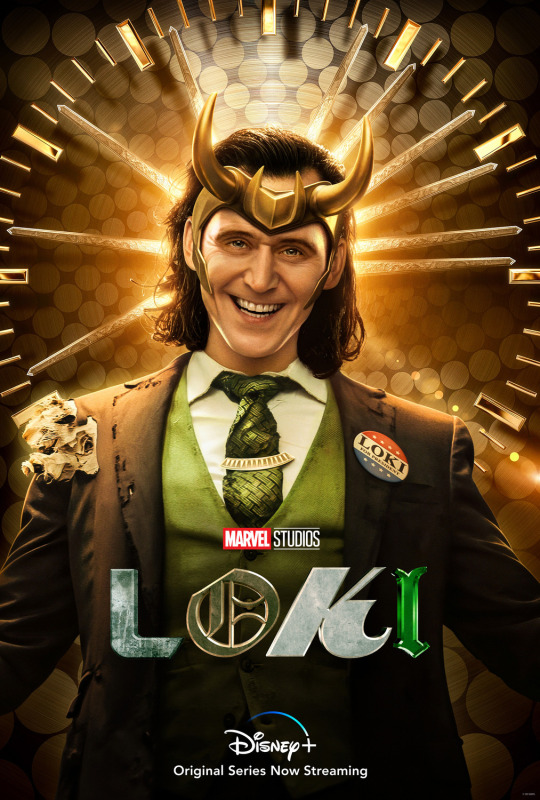
With glorious purpose comes great irresponsibility...
Plot: After stealing the Tesseract and messing with the timeline in Avengers: Endgame, the god of mischief Loki, having recently felt defeat from the Avengers at the Battle of New York and experienced what it means to be Hulk smashed, lands face to face with the TVA (Time Variance Authority) who hire him to help hunt down other time variances.
Out of all the MCU Disney+ shows from first glance Loki seemed like the most self contained standalone one as it was set way way back in the past and seemingly deviated from the main events and story direction that the overall Marvel Cinematic Universe was heading. It seemed as if Loki’s entire existence came to fruition thanks to the fans’ huge love for the character played so splendidly by Tom Hiddleston all these years and this wasn’t going to accumulate to more than fan service. And that would have been perfectly okay, as aforementioned Tom Hiddleston is so well cast as the titular antihero that you can watch his shtick endlessly. He is articulate, delivering lines like machine gun bullets along with a real range of mannerisms and faces to deliver those lines with devastating effect. He is the perfect actor to play Loki because he is both charming and handsome. He also has the English villain thing going for him so he comes across as classy even when he is being nasty and mean. He manages to balance smugness with goofiness and delivers the Nordic Asgardian tongue with Shakespearean gusto! Marvel have always been known for great casting and arguably....heck, not even an argument, he IS Marvel’s best casting choice. Not even Robert Downey Jr.’s Iron Man have as big a fan following as Hiddle-Loki! So making a show for the fans wasn’t out of question.
However, having now watched the Loki season finale it turns out this series has thus far had the biggest impact on the Marvel Cinematic Universe than any other Phase 4 show/movie so far. This thing sets up so much of what’s to come that it comes as a bit of a difficulty to review it as basically anything I say can be classed as a spoiler and then Marvel fans would eat me up like those rats do in the video game A Plague Tale: Innocence. There wouldn’t be a shed of skin left on me!! But what I can talk about is some stuff.
Tom Hiddleston is great as always, and also the clever casting of Owen Wilson as Mobius, one of the members of the TVA, results in a great buddy cop bromance between the two that I wish the show gave more time to, especially since Owen Wilson is so loveable in this, even if he doesn’t get to say his signature catchphrase “WOW”. In fact when the two share the screen together the series is at its highest. The rest of the cast have their moments too, and a stand out who’s role I cannot spoil but is so so good in this is Richard E. Grant. He plays a certain special character and nearly steals the entire show when he appears. Also visually the show looks great and the music score hits some solid notes. I did also enjoy the twists and turns and as I said, the set up for the future is really significant and leaves space for something great to look forward to. I was always wondering how Marvel could keep things interesting following the very conclusive Endgame, which seemed like a perfect franchise ender. But with what Loki sets up it kind of turns everything we know about the cinematic universe upside down, and I cannot wait to see where things go from here.
In terms of negatives, there’s an episode midway through this season’s six episode run which is evident filler and not even good filler. It felt like a knock-off episode of Doctor Who and not a good one, and overall felt pointless to the overall series arc. Secondly, there is a character introduced in this show called Sylvie played by Sophia Di Martino and she is obviously a Hollywood newcomer, however her acting in this was quite distracting. With folks like Hiddleston and Wilson, they fit so swimmingly into their characters, however with Di Martino you can tell that she is acting. None of her emotions felt real and she always kept the same expression on her face which really distracted from the overall immersion of the viewing. And she happens to have a significant role in this show so she’s in many scenes. Again, I don’t like berating individuals and I’m certain that in real life she’s a lovely person, but I didn’t seem to connect to her in this role.
Overall Loki features a lot of Loki, a lot of twists, a lot of turns, and a lot of Marvel-lous moments! And it’s a definite must watch for die hard fans as it’s a significant chapter in the Marvel saga.
Overall score: 7/10
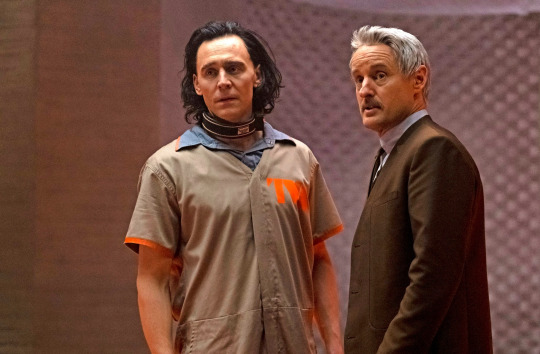
#loki#loki review#tom hiddleston#owen wilson#sophia di martino#2021#disney+#marvel#marvel cinematic universe#mcu#tva#time variance authority#kevin feige#michael waldron#science fiction#time travel#time#gugu mbatha raw#wunmi mosaku#tara strong#jonathan majors#richard e grant#action#adventure#fantasy#loki season 1#loki season 1 review#multiverse
5 notes
·
View notes
Text

Loki Episode 6 Review and Ending Explained: ‘Successfully setting up a strange Phase 4’
Warning: This review contains spoilers for episode 6 of Loki
Loki episode 6, the finale of the latest MCU Disney Plus show, aims to tie up all of the loose ends explored in the previous five installments. It’s a tough task, but the Loki finale puts in a big effort to bring the mysteries surrounding the TVA, the person at the end of the Void, and Loki and Sylvie’s relations to a cohesive conclusion. It attempts this while also posing some new questions for future MCU movies and TV shows to explore. Is episode 6 any good?
Loki episode 6 brought Loki and Sylvie to the citadel at the end of time. There they found Miss Minutes waiting for them. After refusing promises of a throne and happiness, Loki and Sylvie pressed onwards to meet He Who Remains. He explains that he is keeping the timeline stable and safe from evil versions of himself. Ultimately, he is killed by Sylvie and the timeline begins to branch wildly. After a kiss, Sylvie sends Loki back to the TVA. However, this TVA is different and Mobius doesn’t recognize the God of Mischief.
The Loki finale is heavy on the talking, which is necessary to fully explain the madness of the previous five episodes. There is a lot to consume here, but there’s also a fun fight between Sylvie and Loki. What’s more, the Sylvie and Loki kiss will no doubt be a payoff for fans who wanted the two to get together, despite them being the same person and the complications that could cause.
The highlight of Loki episode 6 was actor Jonathan Majors. Though his presence was (literally) cut short, viewers were treated to the charismatic good version of himself. It’s exciting to think about what the evil version of him will be like. He will no doubt appear as Kang the Conqueror in upcoming movies.
It was good to see an MCU TV show having a big impact on the universe. Previous shows have been relatively optional when it comes to keeping up with the goings-on of the MCU. Loki, however, bucks this trend and should be watched to understand what exactly is happening in upcoming movies like Doctor Strange in the Multiverse of Madness, Ant-Man and the Wasp: Quantumania, and, possibly, Spider-Man: No Way Home.
Loki episode 6 is a must-watch as it successfully sets up a strange Phase 4.
Loki episode 6 ending explained
At the end of Loki episode 6, Sylvie kills He Who Remains. With no one at the helm to keep the timeline stable, branches begin to form.
As he dies, He Who Remains tells Sylvie that he will “see [her] again soon.” This is clearly a nod to the versions of himself that will now be let loose. Expect to see an evil version of He Who Remains in upcoming MCU media. Kang the Conqueror looks set to be the next big bad.
Meanwhile, Loki ends up back at the TVA. However, Mobius doesn’t recognize him and the Time-Keeper statues have been replaced by He Who Remains. Clearly, Loki has been sent to another timeline where a different version of the TVA exists. It’s unclear what this means for the character.
It’s also important to mention that Mobius never got to ride a jetski, though his survival means it’s a possibility in the future!
All 6 Episodes of Marvel Studios Loki are now available to Stream on Disney+
#movie magic#mcu#marvel#marvel cinematic universe#movie news#movies#disney+#mcu phase 4#news#tv series#loki#loki of asgard#mcu loki#loki spoilers#loki show#loki series#tom hiddleston#lady loki#kang the conqueror#credits to gamer revolution
5 notes
·
View notes
Text
WandaVision Theory
Okay so this contains some spoilers (mostly specculation really) from wanda vision so... spoilers below cut.
We have all seen the casting for Spiderman 3 & Doctor strange 2.... It includes people like: Andrew Garfield (spiderman) Tobey Maguire (Spiderman) Xochitl Gomez (America Chavez) Ryan Reynolds (Deadpool) Tom Hiddleston (Loki) Among others.... lots of universes being mixed here guys. So I have a theory... Blame my friend for this thing being birthed she had to listen to this as it came out. Peter/Pietro (since xmen pietro is called peter, but wanda knows his as pietro) maximoff is Loki, last we saw loki he had the tesseract and was fleeing, loki is trying to find out the state of the awvengers post end game, and yeah loki likes to fuck with thor & in the comics he lovveeesss just winding people up (God of mischief ffs), so he is trying to find out what the fuck is going on, he is curious about wanda's level of powers (like she is one of the most powerful mcu characters, hes gunna be curious), wanda as we know has a town hostage and is controlling everything, this is similar to avenegrs where loki wanted to rule earth, so hes seeing if she could be of use to him/try figure out a way to get his end goal. End of wanda vision season 1 - wanda looses complete control, she snaps. She breaks the multi verse because she has been believing this pietro is her pietro but with a different face... she finds out it is loki in pietros body which causes her to loose total control and snap a rift in the multi verse OR sword cause her so much stress, vision is questionign everything/realises what wanda did (Sees the footage maybe?) or she has to watch him die again and wanda is so torn over by emotion that she looses control, pietro/loki then realises that oh fuck this is about to go down and wanda uses her powers to try control more and either knocks pietro loki back into loki for or loki shifts just before to do a reveal, he may even try and fix this and help wanda because he knows intense powers and notice she is going insane????? But this ends in her bringing in all the spidermen into the MCU. Bringing deadpool with em. Bringing america chavez with them (She lives in a paralel universe and thats where she got her powers so wanda drags her into MCU because hey, she snapped). Doc strange 2 happens which is about the multi verse. Strange appears at end of wanda vision kinda like "Oh no...." like he's seeing what is about to happen and sees wanda is about to cause he doesnt see this coming, So doc strange 2 is now begining wanda has lost control and merged all theses universes into one - sony,fox,the new characters universe etc etc etc are now all in the MCU universe there is many spider men now (Like into the spider verse) kidna like that level of how it happens they just got ripped into this reality. In spider man 3 this is also playing a part because all the spidermen are still here (Showing this could be a long winded issue/they cant get back to their universe because wanda doesnt know how she did it, doesnt want to do it/cant do it again) Back to doc strange 3 - this movie will be directly dealing with the immediate backlash of this, the many spidermen, deadpool, america chavez all appearing, strange realising what has happened, trying to fix this, loki also there because he doesnt even know whats happened but DAMN is he interested because THIS level of power.... thats interesting to him. Loki's disney+ series happens after the multi verse of madness/during it (like loki's show is bought up in it like "lokis fucking president?!?!?!" like thats another thing thats gone wrong from wanda's melt down and destroying the multi verse, and another thing for strange to to and do damage control on. wanda cant fix this, shes now gone fully off rails, if she watches vision die twice she wont be coming back from that we know. so strange is also trying to help her on how to use her powers as she never reallllly has had training, strange might know people who can help her deal with this insane amount of power. Strange cant fix this alone he needs wanda to try and fix this, and the issue could be a permenant one ( i recon it will be permenant and all wwhat phase 4 & 5 will be about) Doctor strange 2 sees them going between thesee multi verse's they have discovered (maybe strqange & wanda, maybe strange & wong, maybe wanda and someone else who knows... but they are trying to find out how far this damage has gone End of doctor strange is them realising this isnt a quick fix, the world has gone insane as there is all these new ones, ("WHY ARE THERE 3 SPIDER MEN!" - JJJ shouts (cause hey he was in the tobey mcguire spidermen ffs we get him with this package too) spider man 3 then happens & tom holland (The spider men will be refered to by their actors names) see's that um theres another spider man??? what the??? he finds him and they all find out they are the same spider man. This movie plays out similary to into the spiderverse but they dont all go at the end of it because this is a long winded issue. But... now we have america chavez, shes just been bumbling round the MCU being a hero cause she's here.... Monica as you rememebr from wanda vision has her internal sequencing rewritten each time she goes through the hex, this gives her powers cause she has gone through the hex so much at this stage in wanda vision.... So Monica = Photon America Chavez Cassie = Stature Kate bishop = Hawkeye Tom holland = Spiderman How did kate get here and Cassie? KATE So clint stepped down, hawkeye disney+ seems to be like fractions, clints training kate (maybe his family left after end game because jfc clint is probs a wreck, or clint didnt stop so hsi wife left.... maybe they live in iowa happily who knows) Clint was going solo for a while in newyork, when he met this other hawkeye (Hey maybe kate got dragged through the multi verse or maybe she was just a great archer rich kid in newyork who saw hawkeye had fucked off after the blip (maybe she was working during the blip, but towards the end? in comics she took hawkeye mantle while clint was off beign a depressed noodle and he then found out there was 2 hawkeyes and confronted ehr and agreed to train her so maybe somehting simialr to this is what happens in hawkeye) But anyway Clints training kate in new york and yeah shes good. CASSIE Scott after end game & Hope continue being antman and the wasp, but cassie eventually takes over the suit from them (Maybe something happens in antman 3 quantamania that means neither scott or hope can use the suits any more because it will tear them apart, like hank cant use the suits because it takes too much of a toll on his body now and he wouldnt surive it really...) so cassie has taken over the suits and is now operating under the code name stature. This then begins the next arc for the avengers now they have got people powered up, and atleast 1 person from this destruction of the multi verse (America chavez) but we may have more that are discovered over the course of phase 4 that were bought through with the multi verse. So, where does this go??? The young avengers is the next big arc.... Maybe wanda (&peter maximoff? not sure how that would work as young piettro (evan peters one) was from the 80s or something in xmen so is an adult not a kid like he is in wanda vision, which adds to my this isnt pietro but loki thing) But maybe wanda is leading them, maybe not. But the multi verse cant be fixed so they have these heroes now and the avengers kinda died after end game cause tony died and steve fucked off. Sam helps train but hes off with bucky alot too doing a buddy up thing together, but as sam is the new cap he also heads up this young avengers kinda as a mentor for them. Now... right now your pronbs thinking "Morgan stark though" Morgan has a suit... but morgan is still even in 2030 (hawkeye is 2025...) morgan would only be 7..... so she isnt really old enough.... But who else had an iron man suit in the comics? who may of got dragged through the multi verse? Enter riri williams aka iron heart. That takes us up to about end of phase 5 with the rise of the young avengers & champions maybe??? Hi and thanks for coming to my ted talk
#wandavision#marvel#mcu#avengers#spoilers#spiderman#doctor st#loki#monica rambeu#vision#wanda maxim#pietro maximoff#peter maximoff#xmen#deadpool#its only 8pm and this is where my ramblings are going#ive been deprived of marvel too long#send the next episode of wanda vision#i need more clown sword in my life
10 notes
·
View notes
Text

Robert Charles Durman Mitchum (August 6, 1917 – July 1, 1997) was an American actor, director, author, poet, composer, and singer. Mitchum rose to prominence for starring roles in several classic films noirs, and his acting is generally considered a forerunner of the antiheroes prevalent in film during the 1950s and 1960s. His best-known films include Out of the Past (1947), The Night of the Hunter (1955), Cape Fear (1962), and El Dorado (1966). Mitchum was nominated for the Academy Award for Best Supporting Actor for The Story of G.I. Joe (1945). He is also known for his television role as U.S. Navy Captain Victor “Pug” Henry in the epic miniseries The Winds of War (1983) and sequel War and Remembrance (1988).
Mitchum is rated number 23 on the American Film Institute's list of the greatest male stars of Classic American Cinema.
Robert Mitchum was born in Bridgeport, Connecticut, on August 6, 1917, into a Norwegian-Irish Methodist family. His mother, Ann Harriet Gunderson, was a Norwegian immigrant and sea captain's daughter; his father, James Thomas Mitchum, was a shipyard and railroad worker of Irish descent.[3] His older sister, Annette (known as Julie Mitchum during her acting career), was born in 1914. Their father, James Mitchum, was crushed to death in a railyard accident in Charleston, South Carolina, in February 1919. Robert was one year old, and Annette was not yet five. Their mother was awarded a government pension, and soon realized she was pregnant. Her third child, John, was born in September of that year. Ann married again to Major Hugh Cunningham Morris, a former Royal Naval Reserve officer. Ann and Morris had a daughter together, Carol Morris, born July 1927, on the family farm in Delaware. When all of the children were old enough to attend school, Ann found employment as a linotype operator for the Bridgeport Post.
As a child, Mitchum was known as a prankster, often involved in fistfights and mischief. When he was 12, his mother sent him to live with her parents in Felton, Delaware; the boy was promptly expelled from middle school for scuffling with the principal. A year later, in 1930, he moved in with his older sister Annette, in New York's Hell's Kitchen. After being expelled from Haaren High School, he left his sister and traveled throughout the country, hopping on railroad cars, taking a number of jobs, including ditch-digging for the Civilian Conservation Corps and professional boxing. At age 14 in Savannah, Georgia, he said he was arrested for vagrancy and put on a local chain gang. By Mitchum's own account, he escaped and returned to his family in Delaware. During this time, while recovering from injuries that nearly cost him a leg, he met Dorothy Spence, whom he would later marry. He soon went back on the road, eventually "riding the rails" to California.
Mitchum arrived in Long Beach, California, in 1936, staying again with his sister, now going by the name of Julie. She had moved to the West Coast in the hope of acting in movies, and the rest of the Mitchum family soon joined them. During this time, Mitchum worked as a ghostwriter for astrologer Carroll Righter. Julie convinced him to join the local theater guild with her. At The Players Guild of Long Beach, Mitchum worked as a stagehand and occasional bit-player in company productions. He also wrote several short pieces which were performed by the guild. According to Lee Server's biography (Robert Mitchum: Baby, I Don't Care), Mitchum put his talent for poetry to work writing song lyrics and monologues for Julie's nightclub performances.
In 1940, he returned to Delaware to marry Dorothy Spence, and they moved back to California. He gave up his artistic pursuits at the birth of their first child James, nicknamed Josh, and two more children, Chris and Petrine, followed. Mitchum found steady employment as a machine operator during wartime era WWII, with the Lockheed Aircraft Corporation, but the noise of the machinery damaged his hearing. He also suffered a nervous breakdown (which resulted in temporary blindness), due to job-related stress. He then sought work as a film actor, performing initially as an extra and in small speaking parts. His agent got him an interview with Harry Sherman, the producer of Paramount's Hopalong Cassidy western film series, which starred William Boyd; Mitchum was hired to play minor villainous roles in several films in the series during 1942 and 1943. He went uncredited as a soldier in the Mickey Rooney 1943 film The Human Comedy. Also in 1943 he and Randolph Scott were soldiers in the Pacific Island war film Gung Ho.
Mitchum continued to find work as an extra and supporting actor in numerous productions for various studios. After impressing director Mervyn LeRoy during the making of Thirty Seconds Over Tokyo, Mitchum signed a seven-year contract with RKO Radio Pictures. He was groomed for B-Western stardom in a series of Zane Grey adaptations.
Following the moderately successful Western Nevada, RKO lent Mitchum to United Artists for The Story of G.I. Joe (1945). In the film, he portrayed war-weary officer Bill Walker (based on Captain Henry T. Waskow), who remains resolute despite the troubles he faces. The film, which followed the life of an ordinary soldier through the eyes of journalist Ernie Pyle (played by Burgess Meredith), became an instant critical and commercial success. Shortly after filming, Mitchum was drafted into the United States Army, serving at Fort MacArthur, California, as a medic. At the 1946 Academy Awards, The Story of G.I. Joe was nominated for four Oscars, including Mitchum's only nomination for Best Supporting Actor. He finished the year with a Western (West of the Pecos) and a story of returning Marine veterans (Till the End of Time), before filming in a genre that came to define Mitchum's career and screen persona: film noir.
Mitchum was initially known for his work in film noir. His first foray into the genre was a supporting role in the 1944 B-movie When Strangers Marry, about newlyweds and a New York City serial killer. Undercurrent, another of Mitchum's early noir films, featured him as a troubled, sensitive man entangled in the affairs of his brother (Robert Taylor) and his brother's suspicious wife (Katharine Hepburn). John Brahm's The Locket (1946) featured Mitchum as bitter ex-boyfriend to Laraine Day's femme fatale. Raoul Walsh's Pursued (1947) combined Western and noir styles, with Mitchum's character attempting to recall his past and find those responsible for killing his family. Crossfire (also 1947) featured Mitchum as a member of a group of World War II soldiers, one of whom kills a Jewish man. It featured themes of anti-Semitism and the failings of military training. The film, directed by Edward Dmytryk, earned five Academy Award nominations.
Following Crossfire, Mitchum starred in Out of the Past (also called Build My Gallows High), directed by Jacques Tourneur and featuring the cinematography of Nicholas Musuraca. Mitchum played Jeff Markham, a small-town gas-station owner and former investigator, whose unfinished business with gambler Whit Sterling (Kirk Douglas) and femme fatale Kathie Moffett (Jane Greer) comes back to haunt him.
On September 1, 1948, after a string of successful films for RKO, Mitchum and actress Lila Leeds were arrested for possession of marijuana.[10] The arrest was the result of a sting operation designed to capture other Hollywood partiers as well, but Mitchum and Leeds did not receive the tipoff. After serving a week at the county jail (he described the experience to a reporter as being "like Palm Springs, but without the riff-raff"), Mitchum spent 43 days (February 16 to March 30) at a Castaic, California, prison farm. Life photographers were permitted to take photos of him mopping up in his prison uniform. The arrest inspired the exploitation film She Shoulda Said No! (1949), which starred Leeds. The conviction was later overturned by the Los Angeles court and district attorney's office on January 31, 1951, after being exposed as a setup.
Despite, or because of, Mitchum's troubles with the law and his studio, his films released immediately after his arrest were box-office hits. Rachel and the Stranger (1948) featured Mitchum in a supporting role as a mountain man competing for the hand of Loretta Young, the indentured servant and wife of William Holden. In the film adaptation of John Steinbeck's novella The Red Pony (1949), he appeared as a trusted cowhand to a ranching family. He returned to film noir in The Big Steal (also 1949), where he reunited with Jane Greer in an early Don Siegel film.
In Where Danger Lives (1950), Mitchum played a doctor who comes between a mentally unbalanced Faith Domergue and cuckolded Claude Rains. The Racket was a noir remake of the early crime drama of the same name and featured Mitchum as a police captain fighting corruption in his precinct. The Josef von Sternberg film, Macao (1952), had Mitchum as a victim of mistaken identity at an exotic resort casino, playing opposite Jane Russell. Otto Preminger's Angel Face was the first of three collaborations between Mitchum and British stage actress Jean Simmons. In this film, she played an insane heiress who plans to use young ambulance driver Mitchum to kill for her.
Mitchum was fired from Blood Alley (1955), due to his conduct, reportedly having thrown the film's transportation manager into San Francisco Bay. According to Sam O'Steen's memoir Cut to the Chase, Mitchum showed up on-set after a night of drinking and tore apart a studio office when they did not have a car ready for him. Mitchum walked off the set of the third day of filming Blood Alley, claiming he could not work with the director. Because Mitchum was showing up late and behaving erratically, producer John Wayne, after failing to obtain Humphrey Bogart as a replacement, took over the role himself.
Following a series of conventional Westerns and films noirs, as well as the Marilyn Monroe vehicle River of No Return (1954), Mitchum appeared in Charles Laughton's only film as director: The Night of the Hunter (1955). Based on a novel by Davis Grubb, the thriller starred Mitchum as a monstrous criminal posing as a preacher to find money hidden by his cellmate in the cellmate's home. His performance as Reverend Harry Powell is considered by many to be one of the best of his career.[15][16] Stanley Kramer's melodrama Not as a Stranger, also released in 1955, was a box-office hit. The film starred Mitchum against type, as an idealistic young doctor, who marries an older nurse (Olivia de Havilland), only to question his morality many years later. However, the film was not well received, with most critics pointing out that Mitchum, Frank Sinatra, and Lee Marvin were all too old for their characters. Olivia de Havilland received top billing over Mitchum and Sinatra.
On March 8, 1955, Mitchum formed DRM (Dorothy and Robert Mitchum) Productions to produce five films for United Artists; four films were produced. The first film was Bandido (1956). Following a succession of average Westerns and the poorly received Foreign Intrigue (1956), Mitchum starred in the first of three films with Deborah Kerr. The John Huston war drama Heaven Knows, Mr. Allison, starred Mitchum as a Marine corporal shipwrecked on a Pacific Island with a nun, Sister Angela (Deborah Kerr), as his sole companion. In this character study, they struggle to resist the elements and the invading Japanese army. The film was nominated for two Academy Awards, including Best Actress and Best Adapted Screenplay. For his role, Mitchum was nominated for a BAFTA Award for Best Foreign Actor. In the WWII submarine classic The Enemy Below (1956), Mitchum gave a strong performance as U.S. Naval Lieutenant Commander Murrell, the captain of a U.S. Navy destroyer who matches wits with a German U-boat captain Curt Jurgens, who starred with Mitchum again in the legendary 1962 movie The Longest Day. The film won an Oscar for Special Effects.
Thunder Road (1958), the second DRM Production, was loosely based on an incident in which a driver transporting moonshine was said to have fatally crashed on Kingston Pike in Knoxville, Tennessee, somewhere between Bearden Hill and Morrell Road. According to Metro Pulse writer Jack Renfro, the incident occurred in 1952 and may have been witnessed by James Agee, who passed the story on to Mitchum. He starred in the movie, produced, co-wrote the screenplay, and is rumored to have directed much of the film. It costars his son James, as his on screen brother, in a role originally intended for Elvis Presley. Mitchum also co-wrote (with Don Raye) the theme song, "The Ballad of Thunder Road".
He returned to Mexico for The Wonderful Country (1959) and Ireland for A Terrible Beauty/The Night Fighters for the last of his DRM Productions.
Mitchum and Kerr reunited for the Fred Zinnemann film, The Sundowners (1960), where they played husband and wife struggling in Depression-era Australia. Opposite Mitchum, Kerr was nominated for yet another Academy Award for Best Actress, while the film was nominated for a total of five Oscars. Mitchum was awarded that year's National Board of Review award for Best Actor for his performance. The award also recognized his superior performance in the Vincente Minnelli Western drama Home from the Hill (also 1960). He was teamed with former leading ladies Kerr and Simmons, as well as Cary Grant, for the Stanley Donen comedy The Grass Is Greener the same year.
Mitchum's performance as the menacing rapist Max Cady in Cape Fear (1962) brought him further renown for playing cold, predatory characters. The 1960s were marked by a number of lesser films and missed opportunities. Among the films Mitchum passed on during the decade were John Huston's The Misfits (the last film of its stars Clark Gable and Marilyn Monroe), the Academy Award–winning Patton, and Dirty Harry. The most notable of his films in the decade included the war epics The Longest Day (1962) and Anzio (1968), the Shirley MacLaine comedy-musical What a Way to Go! (1964), and the Howard Hawks Western El Dorado (1967), a remake of Rio Bravo (1959), in which Mitchum took over Dean Martin's role of the drunk who comes to the aid of John Wayne. He teamed with Martin for the 1968 Western 5 Card Stud, playing a homicidal preacher.
One of the lesser-known aspects of Mitchum's career was his foray into music as a singer. Critic Greg Adams writes, "Unlike most celebrity vocalists, Robert Mitchum actually had musical talent." Mitchum's voice was often used instead of that of a professional singer when his character sang in his films. Notable productions featuring Mitchum's own singing voice included Rachel and the Stranger, River of No Return, and The Night of the Hunter. After hearing traditional calypso music and meeting artists such as Mighty Sparrow and Lord Invader while filming Heaven Knows, Mr. Allison in the Caribbean islands of Tobago, he recorded Calypso – is like so ... in March 1957. On the album, released through Capitol Records, he emulated the calypso sound and style, even adopting the style's unique pronunciations and slang. A year later, he recorded a song he had written for Thunder Road, titled "The Ballad of Thunder Road". The country-style song became a modest hit for Mitchum, reaching number 69 on the Billboard Pop Singles chart. The song was included as a bonus track on a successful reissue of Calypso ... and helped market the film to a wider audience.
Although Mitchum continued to use his singing voice in his film work, he waited until 1967 to record his follow-up record, That Man, Robert Mitchum, Sings. The album, released by Nashville-based Monument Records, took him further into country music, and featured songs similar to "The Ballad of Thunder Road". "Little Old Wine Drinker Me", the first single, was a top-10 hit at country radio, reaching number nine there, and crossed over onto mainstream radio, where it peaked at number 96. Its follow-up, "You Deserve Each Other", also charted on the Billboard Country Singles chart. He sang the title song to the Western Young Billy Young, made in 1969.
Mitchum made a departure from his typical screen persona with the 1970 David Lean film Ryan's Daughter, in which he starred as Charles Shaughnessy, a mild-mannered schoolmaster in World War I–era Ireland. At the time of filming, Mitchum was going through a personal crisis and planned to commit suicide. Aside from a personal crisis, his recent films had been critical and commercial flops. Screenwriter Robert Bolt told him that he could commit suicide after the film was finished and that he would personally pay for his burial. Though the film was nominated for four Academy Awards (winning two) and Mitchum was much publicized as a contender for a Best Actor nomination, he was not nominated. George C. Scott won the award for his performance in Patton, a project Mitchum had rejected for Ryan's Daughter.
The 1970s featured Mitchum in a number of well-received crime dramas. The Friends of Eddie Coyle (1973) had the actor playing an aging Boston hoodlum caught between the Feds and his criminal friends. Sydney Pollack's The Yakuza (1974) transplanted the typical film noir story arc to the Japanese underworld. He also appeared in 1976's Midway about an epic 1942 World War II battle. Mitchum's stint as an aging Philip Marlowe in the Raymond Chandler adaptation Farewell, My Lovely (1975) was sufficiently well received by audiences and critics for him to reprise the role in 1978's The Big Sleep.
In 1982, Mitchum played Coach Delaney in the film adaptation of playwright/actor Jason Miller's 1973 Pulitzer Prize-winning play That Championship Season.
At the premiere for That Championship Season, Mitchum, while intoxicated, assaulted a female reporter and threw a basketball that he was holding (a prop from the film) at a female photographer from Time magazine, injuring her neck and knocking out two of her teeth. She sued him for $30 million for damages. The suit eventually "cost him his salary from the film."
That Championship Season may have indirectly led to another debacle for Mitchum several months later. In a February 1983 Esquire interview, he made several racist, anti-Semitic and sexist statements, including, when asked if the Holocaust occurred, responded "so the Jews say." Following the widespread negative response, he apologized a month later, saying that his statements were "prankish" and "foreign to my principle." He claimed that the problem had begun when he recited a racist monologue from his role in That Championship Season, the writer believing the words to be his own. Mitchum, who claimed that he had only reluctantly agreed to the interview, then decided to "string... along" the writer with even more incendiary statements.
Mitchum expanded to television work with the 1983 miniseries The Winds of War. The big-budget Herman Wouk story aired on ABC, starring Mitchum as naval officer "Pug" Henry and Victoria Tennant as Pamela Tudsbury, and examined the events leading up to America's involvement in World War II. He returned to the role in 1988's War and Remembrance, which continued the story through the end of the war.
In 1984, Mitchum entered the Betty Ford Center in Palm Springs, California for treatment of a drinking problem.
He played George Hazard's father-in-law in the 1985 miniseries North and South, which also aired on ABC.
Mitchum starred opposite Wilford Brimley in the 1986 made-for-TV movie Thompson's Run. A hardened con (Mitchum), being transferred from a federal penitentiary to a Texas institution to finish a life sentence as a habitual criminal, is freed at gunpoint by his niece (played by Kathleen York). The cop (Brimley) who was transferring him, and has been the con's lifelong friend and adversary for over 30 years, vows to catch the twosome.
In 1987, Mitchum was the guest-host on Saturday Night Live, where he played private eye Philip Marlowe for the last time in the parody sketch, "Death Be Not Deadly". The show ran a short comedy film he made (written and directed by his daughter, Trina) called Out of Gas, a mock sequel to Out of the Past. (Jane Greer reprised her role from the original film.) He also was in Bill Murray's 1988 comedy film, Scrooged.
In 1991, Mitchum was given a lifetime achievement award from the National Board of Review of Motion Pictures, in the same year he received the Telegatto award and in 1992 the Cecil B. DeMille Award from the Golden Globe Awards.
Mitchum continued to act in films until the mid-1990s, such as in Jim Jarmusch's Dead Man, and he narrated the Western Tombstone. He also appeared, in contrast to his role as the antagonist in the original, as a protagonist police detective in Martin Scorsese's remake of Cape Fear, but the actor gradually slowed his workload. His last film appearance was a small but pivotal role in the television biopic, James Dean: Race with Destiny, playing Giant director George Stevens. His last starring role was in the 1995 Norwegian movie Pakten.
A lifelong heavy smoker, Mitchum died on July 1, 1997, in Santa Barbara, California, due to complications of lung cancer and emphysema. He was about five weeks shy of his 80th birthday. His body was cremated and his ashes scattered at sea, though there is a plot marker in the Odd Fellows Cemetery in Delaware. He was survived by his wife of 57 years, Dorothy Mitchum (May 2, 1919 – April 12, 2014, Santa Barbara, California, aged 94); his sons, actors James Mitchum and Christopher Mitchum; and his daughter, writer Petrine Day Mitchum. His grandchildren, Bentley Mitchum and Carrie Mitchum, are actors, as was his younger brother, John, who died in 2001. Another grandson, Kian, is a successful model.
Mitchum is regarded by some critics as one of the finest actors of the Golden Age of Hollywood. Roger Ebert called him "the soul of film noir." Mitchum, however, was self-effacing; in an interview with Barry Norman for the BBC about his contribution to cinema, Mitchum stopped Norman in mid flow and in his typical nonchalant style, said, "Look, I have two kinds of acting. One on a horse and one off a horse. That's it." He had also succeeded in annoying some of his fellow actors by voicing his puzzlement at those who viewed the profession as challenging and hard work. He is quoted as having said in the Barry Norman interview that acting was actually very simple and that his job was to "show up on time, know his lines, hit his marks, and go home". Mitchum had a habit of marking most of his appearances in the script with the letters "n.a.r.", which meant "no action required", which critic Dirk Baecker has construed as Mitchum's way of reminding himself to experience the world of the story without acting upon it.
AFI's 100 Years...100 Stars lists Mitchum as the 23rd-greatest male star of classic Hollywood cinema. AFI also recognized his performance as the menacing rapist Max Cady and Reverend Harry Powell as the 28th and 29th greatest screen villains, respectively, of all time as part of AFI's 100 Years...100 Heroes and Villains. He provided the voice of the famous American Beef Council commercials that touted "Beef ... it's what's for dinner", from 1992 until his death.
A "Mitchum's Steakhouse" is in Trappe, Maryland, where Mitchum and his family lived from 1959 to 1965.
#robert mitchum#classic hollywood#classic movie stars#golden age of hollywood#old hollywood#1940s hollywood#1950s hollywood#1960s hollywood#1970s hollywood#1980s hollywood#1990s hollywood#hollywood legend
19 notes
·
View notes
Text
How Thor Changed the Marvel Cinematic Universe
https://ift.tt/33NlKGy
Marvel’s Thor, the first theatrical live-action film to feature the comic book giant’s version of the Norse God of Thunder, opened in theaters a decade ago, on May 6, 2011.
Directed by Kenneth Branagh and starring a then little-known Chris Hemsworth in the title role, Thor was the fourth film in the still-nascent Marvel Cinematic Universe. It was also — as we look back at it now — a pivotal one in the development of the MCU.
“I’m very proud of my part of it,” Branagh told us a couple of years ago about his handling of Thor. “Which was providing a sort of backbone that they could comically riff off, but at least it originally contained some of the high stakes Nine Realms import that that larger mythology has to have as well.”
Thor took the franchise off the Earth for the first time and into the cosmic side of the Marvel mythology, introducing audiences to the Nine Realms, the kingdom of Asgard and other mind-bending concepts that comic fans had adored for years but which were a major risk to put in front of mainstream moviegoers.
Even the character of Thor — with his helmet and his hammer and his arch way of speaking — often seemed to skate perilously close to laughable in the pages of the comics themselves. But he was also a mainstay of the Marvel line and a charter member of the Avengers, the superhero team that Marvel based its entire initial run of films upon.
Marvel
Thor didn’t take the Rainbow Bridge to the screen
A Thor movie based on the Marvel Comics version of the character had, surprisingly, been bandied around for years even before there was a Marvel Cinematic Universe.
The God of Thunder debuted on the page in Journey into Mystery #83 (August 1962), created by Stan Lee, Larry Lieber, and Jack Kirby. A founding member of the Avengers, he joined Iron Man, the Hulk, Ant-Man, and the Wasp in the pages of The Avengers #1 (September 1963). In the ensuing decades, he has starred in multiple iterations of the Avengers comics, plus many ongoing and limited series of his own.
An animated version of the character debuted in 1966’s Marvel Super-Friends show, while the first live-action incarnation of Thor (played by Eric Kramer) showed up in the 1988 TV movie The Incredible Hulk Returns, a follow-up to the late 1970s series The Incredible Hulk.
While Thor continued to turn up in various animated Marvel properties, it was in 1991 that the first full-length, live-action Thor movie was proposed — by no less than Sam Raimi.
The director, who later went on to make the first three Spider-Man movies and who is now working in the MCU on Doctor Strange in the Multiverse of Madness, revealed to the The Hollywood Reporter in the wake of Stan Lee’s passing that he pitched a Thor movie to the Marvel Universe co-creator over lunch.
“We worked together writing treatments and took it to Fox and pitched it,” Raimi recalled. “And they said, ‘Absolutely no. Comic books don’t make good movies.’ This was in 1991.”
The rights to Thor bounced around Hollywood for a few more years (at one point it was set up at Sony with David S. Goyer writing and possibly directing) until landing back at Marvel Studios, which had reinvented itself as an independently financed production company in 2005 with distribution through Paramount Pictures. The studio, run at the time by David Maisel with Kevin Feige as president of production, hired Mark Protosevich (I Am Legend and the unfilmed Batman Unchained) to write a script for Thor, with Matthew Vaughn (X-Men: First Class) coming aboard to direct in August 2007.
Marvel
Enter Tom Hiddleston as Loki…
No sooner did Matthew Vaughn sign up to direct Thor than he seemingly left just as quickly, although it was officially announced in May 2008 that he was departing. Creative and budget issues seemed to have sealed his exit. “Marvel loves the script,” he wrote in The Guardian in late 2007. “The only problem is that it has been costed at $300m and they ask how I am going to reduce it by $150m.”
Even though Thor had already been scheduled for a June 4, 2010 release date, Marvel still had to find a director. Talks were held with Guillermo del Toro, but he decided to direct The Hobbit instead (which he ended up leaving as well). At the end of its search, Marvel finally chose Kenneth Branagh, the Irish actor and director best known for his epic adaptations of Shakespeare’s Hamlet and Henry V — which kind of provided an idea of the tone Marvel was looking for.
Branagh was finally signed in December 2008, telling MTV News, “It’s a chance to tell a big story on a big scale…It’s a human story right in the center of a big epic scenario.”
Once Branagh was signed, the movie’s release date was pushed back from June/July 2010 to May 6, 2011, providing plenty of time for the film’s extensive visual effects to be designed and created and for Branagh to find his cast — starting with the God of Thunder himself.
Read more
Movies
Upcoming Marvel Movies Release Dates: MCU Phase 4 Schedule, Cast, and Story Details
By Mike Cecchini and 1 other
Movies
How Black Widow Could Build The MCU’s Future
By Kayti Burt
The first person allegedly approached was Daniel Craig, who had just starred in his second James Bond film, Quantum of Solace. It was because of his commitments to the already massive 007 franchise that Craig turned down the hammer-wielding Asgardian, although it’s somehow hard to imagine the tough-as-nails Craig as the egotistical (at least at first), young Odinson.
A long list of young, relatively unknown actors tested for the part, including Chris Hemsworth (who was just making his brief but scene-stealing appearance as James Kirk’s father in J.J. Abrams’ Star Trek), his brother Liam, the equally obscure Tom Hiddleston, Kevin McKidd from Grey’s Anatomy, Alexander Skarsgard (Godzilla vs. Kong), Charlie Hunnam (Sons of Anarchy), Joel Kinnaman (The Suicide Squad), and others. But Chris Hemsworth ultimately won the day, with Hiddleston landing the consolation gift that would keep on giving, the role of Thor’s villainous adopted brother Loki.
“That was my starting point, was that you have a character with a predisposition toward mischief,” Hiddleston said about playing the trickster god, during a 2010 set visit attended by this reporter in Manhattan Beach, California. “An inclination toward chaos and a delight in imbalance, and you couple that with the fierce intelligence that he has, and a chess master’s ability to manipulate events three or four steps ahead of the game.”
Adding even more gravitas to the production was the signing of the legendary Anthony Hopkins to play Thor’s father, Odin, along with Natalie Portman as Jane Foster, Rene Russo as Thor’s mom Frigga, Colm Feore as Laufey, the king of the Frost Giants, Idris Elba as Heimdall, and others. Also signed: Samuel L. Jackson for his third appearance as Nick Fury (in an end credits bonus scene) and Jeremy Renner as Clint Barton/Hawkeye, marking the live-action debut of the bow-and-arrow-wielding Avenger.
Filming on Thor began in mid-January 2010 and wound down in early May, with shooting taking place at Raleigh Studios in Manhattan Beach, California (Marvel’s studio home in the MCU’s early years), Santa Fe, and other parts of New Mexico, and locations in northern California.
Colm Feore told The Deadbolt that the Shakespearean training which he, Branagh, and Hopkins all shared enabled them to quickly communicate with each other while shaping the characters and finding the right tone: “One of the things that was enormously helpful on Thor was that during the breaks, Tony, myself, and Ken would be talking in Shakespearean shorthand about what the characters were doing, what we thought they may be like, and how we could focus our attention more intelligently.”
During that same set visit to the Manhattan Beach set of Thor, Marvel president of production Kevin Feige told this reporter and others that the movie was going to feature more extensive post-production work than other Marvel films. “When you walk around Captain America or Iron Man, you can get it,” he explained. “With Thor, what you’re seeing is only 30% of what the movie will be. This is the big question mark and to me that makes it the most exciting. I like it when people don’t exactly know what we’re going to do.”
Reshoots were completed in late 2010, while The Avengers director Joss Whedon shot the end credits scene in which Nick Fury reveals the Infinity Stone known as the Tesseract to Dr. Erik Selvig (Stellan Skarsgard).
Marvel
Marvel takes a big swing with Thor’s hammer
Introducing Thor and the Asgardians — who were essentially aliens, with technology so far ahead of our own that they seemed like gods to the ancient, more primitive people of Norway more than a millennium ago — was a major gamble for the MCU and its then-president of production (and now Chief Creative Officer) Kevin Feige.
Out of Marvel’s first three films, Iron Man and Iron Man 2 were massive, out-of-the-box hits, while The Incredible Hulk was a middling success at best. Yet all three films were Earthbound and dealt with plausible (as far as it went) science and technology. The science of Thor was — to borrow a phrase from the late science fiction titan Arthur C. Clarke — indistinguishable from magic.
“Asgardians are kind of ‘been there, done that’ when it comes to that kind of stuff,” said co-producer Craig Kyle to this reporter and others on the set visit. “For them to send you across the universe, it’s as easy as turning a key … Their technology is only as sophisticated as it needs to be to do extraordinary things.”
Making Thor, Odin and the other inhabitants of Asgard, Jotunheim and the rest of the Nine Realms into extra-terrestrial beings mistaken for gods by ancient humans took Thor away from sword-and-sorcery and fantasy and more overtly into the science fiction genre. But it also provided the film with a back story and mythology that was perhaps easier for modern movie fans to swallow — more Star Wars than the Völuspá.
“We just kept trying to humanize it all, and keep it very real,” Chris Hemsworth told Superhero Hype at the time about his approach to the title character. “Look into all the research about the comic books that we could, but also bring it back to ‘Who is this guy as a person, and what’s his relationship with people in the individual scenes?’ And working with someone like Kenneth Branagh, who has all those bases covered and has so many ideas, it was a hell of a time!”
In addition to taking the big creative risk of bringing Asgard and Thor to the screen, the movie took several other chances as well. Starting a tradition that Marvel would return to with films like Captain Marvel and Guardians of the Galaxy, Thor did not function as a traditional origin story. We meet Thor, Loki, Odin, and enter Asgard with only a brief introduction detailing the history of ill will and war between the Asgardians and the Frost Giants.
Thor’s journey in the film is not that of an ordinary character being bestowed with great powers and learning how to use them, the typical arc of a superhero film. He is fully formed here, if flawed, and as the film progresses he learns to be a better version of the immensely powerful being that he already is — with the help of the human beings that he meets during his fall to Earth.
When Thor — the likely successor to his father’s throne — reignites hostilities with the Frost Giants partially due to his own immaturity, Odin decrees him unworthy of wielding Mjolnir and banishes him, powerless, to Earth. That leaves the door open for the crafty Loki — who has discovered that he is not Asgardian after all, but the child of Frost Giants — to manipulate and scheme his way into power himself.
Marvel’s other big gamble was making Loki a much more fully developed antagonist than had been previously seen in many comic book movies. Skillfully portrayed by Hiddleston in a performance that made him an instant star, Loki is an empathetic, nuanced character whose longing for the love and attention of his adopted father — who lavishes more of both on Thor — leads him down a dark path and into a character arc that would take several years and movies to play out.
“I think Loki intuitively feels that he doesn’t belong there, he doesn’t belong with the family in Asgard and doesn’t belong in the pantheon of gods,” said Hiddleston at the time. “He’s confused about his place in the universe … We all reach a point in our lives where we think, ‘What the hell are we supposed to do with our life?’ Thor reaches that point in this film and Loki does as well, so yes, maybe if Odin had made him feel valued and respected and essential to Asgard, then it would have been okay.”
Marvel
Thor smashes all preconceptions
Thor had its world premiere in Sydney, Australia on April 17, 2011 and opened in that country — Hemsworth’s native land — four days later. It premiered in 56 more markets before finally opening in North America on May 6, 2011.
The film earned a 77% fresh rating and mixed reviews on Rotten Tomatoes, with critics praising the performances by Hemsworth and Hiddleston, as well as the grandiose family drama on Asgard, but less impressed by Thor’s journey to Earth and the climactic battle there against the massive golem-like Destroyer sent by Loki to kill Thor.
More importantly for Marvel, the film connected with audiences despite the perception that Thor was largely unfamiliar or dated. Thor earned $181 million at the North American box office and a further $268 million abroad for a worldwide total of $449 million.
While that ranks it near the bottom of the 23 MCU movies released to date (along with Ant-Man and Captain America: The First Avenger), it was a far from shabby showing for the early MCU and proved Marvel’s calculation that it could expand Marvel’s footprint on film beyond already established characters like Spider-Man, the X-Men and the Hulk.
“I liked it when people said, ‘Iron Man’s the B-Team. You’re calling out the B-Team!’ We knew it wasn’t,” said Feige on set about using what were perceived as lower-tier Marvel heroes. “We knew it was going to be great. And that holds true for Thor … here’s another one that will redefine us and at least raise the bar of what a comic book movie is, for both people who’ve read comics and those who haven’t.”
Thor expanded the boundaries of the MCU into the realms of space, alternate dimensions and cosmic conflicts, while putting another key part in place for the impending arrival of the Avengers. And while 2013’s follow-up, Thor: The Dark World, was a misstep and considered one of Marvel’s few outright failures, the studio brilliantly reinvented the character in 2017 with Taika Waititi’s Thor: Ragnarok, moving him away from the initial Shakespearean grandiosity and into a more humorous space.
cnx.cmd.push(function() { cnx({ playerId: "106e33c0-3911-473c-b599-b1426db57530", }).render("0270c398a82f44f49c23c16122516796"); });
That in turn allowed Thor and Hemsworth to have one of the most profound character arcs across the entire span of Avengers: Infinity War and Avengers: Endgame. His story in those films, the box office clout of Ragnarok, and Hemsworth’s enthusiasm for the role led Marvel to commission 2022’s Thor: Love and Thunder — marking the first time an MCU hero is venturing into a fourth solo movie.
Ten years later, while not a perfect film by any means, Thor is still an enjoyable, consciously weird Marvel epic that proved the God of Thunder could bring the lightning even to modern audiences. And while Thor has seemingly abandoned the throne of Asgard for now, his first film’s place in the MCU pantheon is secure.
The post How Thor Changed the Marvel Cinematic Universe appeared first on Den of Geek.
from Den of Geek https://ift.tt/2RWjeeA
3 notes
·
View notes
Text
SDCC 2019: All of the Marvel Studios News Coming Out of Hall H at San Diego Comic-Con
Natalie Portman will return for Marvel Studios’ Thor: Love and Thunder, joining stars Chris Hemsworth and Tessa Thompson. Taika Waititi returns as director, and he confirmed that Jane Foster will become the Mighty Thor, goddess of Thunder. Marvel Studios’ Thor: Love and Thunder will arrive in theaters November 5, 2021.

Marvel Studios’ The Falcon and The Winter Soldier! Anthony Mackie (The Falcon) and Sebastian Stan (The Winter Soldier) came on stage to greet the fans, and it was revealed that Daniel Brühl will return as the villain, Baron Zemo. Marvel Studios’ The Falcon and The Winter Soldier will come to Disney+ in the fall of 2020.
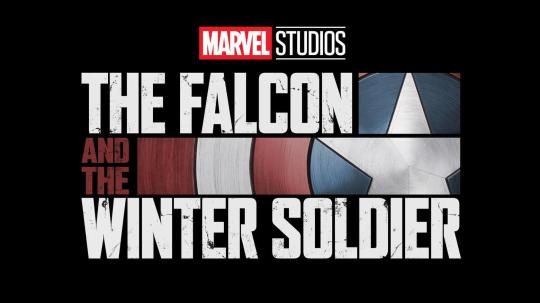
Marvel Studios’ Shang-Chi and the Legend of the Ten Rings starring Simu Liu in the title role. Appearing alongside Liu will be Awkwafina in an undisclosed role and Tony Leung as the (real) Mandarin. Marvel Studios’ Shang-Chi and the Legend of the Ten Rings will be directed by Destin Daniel Cretton. In theaters February 12, 2021.
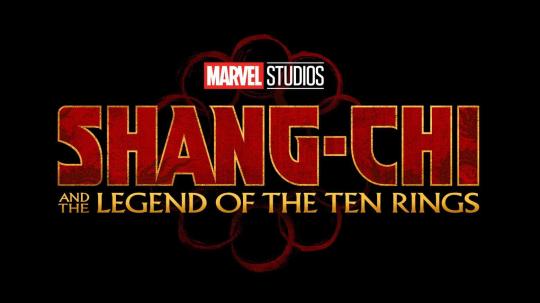
Marvel Studio’s WandaVision, an original series starring Elizabeth Olsen and Paul Bettany, reprising their MCU roles as Wanda Maximoff/Scarlet Witch and Vision. Costarring with them is Teyonah Parris, whom Feige revealed would be playing the adult Monica Rambeau, who was introduced as a child in Marvel Studios' Captain Marvel. Marvel Studios’ WandaVision will arrive on Disney+ in the spring of 2021.

The MCU's favorite trickster Loki will also make his way to Disney+! Marvel Studios’ Loki, an original series starring Tom Hiddleston, will see the god of mischief causing even more trouble starting in the spring of 2021.
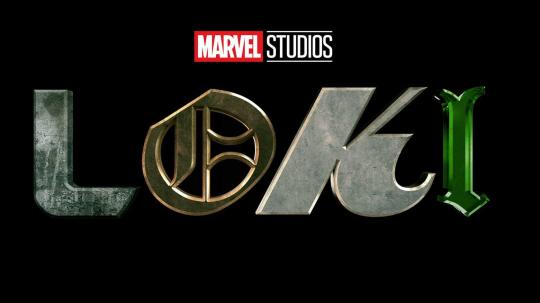
Marvel Studios’ Doctor Strange in the Multiverse of Madness starring Benedict Cumberbatch as Stephen Strange with Scott Derrickson returning as director. But joining Doctor Strange this time around will be the Scarlet Witch, played by Elizabeth Olsen. In another twist, the events of Doctor Strange in the Multiverse of Madness will connect with the Disney+ series Marvel Studios' WandaVision. Marvel Studios’ Doctor Strange in the Multiverse of Madness will cast its spell in theaters May 7, 2021.

The legacy of the WHAT IF...? comics will be adapted for the screen! Marvel Studios’ What If…?, the first animated series in the MCU, will star Jeffrey Wright as the voice of The Watcher -- many actors from across the MCU will reprise their roles as voice talent. What If…? will present alternate realities in the Marvel Universe that are set to warp your world in the summer of 2021, exclusively on Disney+.

Another character from the MCU will appear on the small screen: Marvel Studios’ Hawkeye starring Jeremy Renner, who joined Kevin Feige onstage share more details about the show, which will introduce Kate Bishop, who has been hitting her mark in Marvel Comics. Marvel Studios’ Hawkeye will come to Disney+ in the fall of 2021.
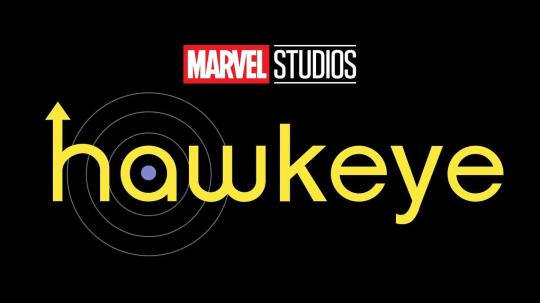
Marvel Studios’ Black Widow starring Scarlett Johansson reprising her MCU role. She will be joined by David Harbour as Alexei AKA The Red Guardian, Florence Pugh as Yelena, O-T Fagbenle as Mason, and Rachel Weisz as Melina. Cate Shortland is directing. Marvel Studios’ Black Widow will come to theaters May 1, 2020.

And if all this massive Marvel Studios news wasn't enough... Kevin Feige introduced Mahershala Ali as Blade! Not only that -- Marvel Studios' Blade will also slash its way into theaters!

Marvel Studios’ The Eternals starring Richard Madden as Ikaris, Kumail Nanjiani as Kingo, Lauren Ridloff as Makkari, Brian Tyree Henry as Phastos, Salma Hayek as Ajak, Lia McHugh as Sprite, Don Lee as Gilgamesh, and Angelina Jolie as Thena. The Eternals, which will be directed by Chloé Zhao, will come to theaters November 6, 2020.
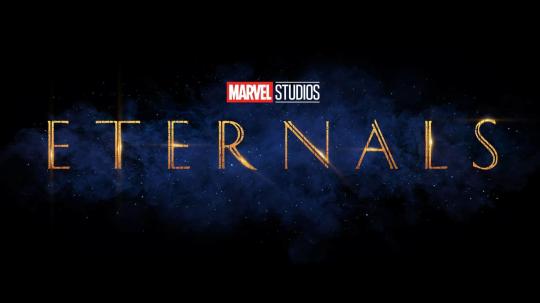
#photos#news#sdcc#sdcc 2019#marvel#marvel studios’ thor: love and thunder#thor: love and thunder#thor#marvel studios’ the falcon and the winter soldier#the falcon and the winter soldier#marvel studios’ shang-chi and the legend of the ten rings#shang-chi and the legend of the ten rings#marvel studio’s wandavision#wandavision#marvel studios’ loki#loki#marvel studios’ doctor strange in the multiverse of madness#doctor strange in the multiverse of madness#marvel studios’ what if…?#what if…?#marvel studios’ hawkeye#hawkeye#marvel studios’ black widow#black widow#marvel studios' blade#blade#marvel studios’ the eternals#the eternals
1K notes
·
View notes